Date and time
To enhance your event attendance whether online or face to face, why not download the new RSA Mobile app – RSA Hub the app store. You can find a short how-to video and more information here.
Regions Cities Industry Webinar Series
Global megatrends are transforming the way we live, work, interact, finance, produce and consume. At the same time, the increasing environmental impacts of human activities have sharpened the focus on sustainability of further development. New technologies potentially provide an opportunity to address, perhaps for the first time in the history of mankind, a substantial majority of the fundamental societal challenges, from nutrition, energy availability and sustainability, to access to products, services and information. However, these same global megatrends can also be highly divisive and therefore represent one of the biggest challenges for a global social, political and economic cohesion and even peaceful coexistence in more than a generation. In addition we have newly remembered our global vulnerability to shocks such as the coronavirus and there can be no doubt that this will change the world in which we live prompting new questions and priorities.
The RSA Regions Cities Industry Webinar Series presents acclaimed experts in the field of regional studies, science and policy. This monthly series is open to all and free to attend but require registration. Recordings are available via the RSA Lounge.
The webinars run live once a month (usually on a Wednesday) and include time for discussion, questions and comments.
Follow #RSAWebinar for updates and latest news.
Webinar Series archive
Past webinars from both RSA Webinar series will be available on demand for RSA members via the RSA Lounge. We welcome new members to the RSA. More information on membership benefits and how to join the Association can be found here.
About the RSA
The Regional Studies Association (RSA) in a learned society and membership organisation bringing together academics and policymakers working in regional research, development and policy. The RSA publishes five journals, two book series, an online magazine and blog, funds research and awards excellence in the field, delivers knowledge exchange and provides networking opportunities and training for the global regional studies and wider community. More on the RSA at www.regionalstudies.org.
Forthcoming Webinars:
28th May 2025 13.00 BST, 14.00 CEST – RSA Covid and Gender Study. Resilience and Recovery: Estimating the Effects of the Covid-19 Pandemic on Publication in Regional Studies Association Journals
The impacts of the COVID-19 pandemic were deep and widespread and the effects on research and researchers have been widely documented. This paper contributes to this literature through an investigation of the gendered and geographic impacts of the pandemic on the five Regional Studies Association (RSA) journals. With the cooperation of Taylor and Francis, the RSA’s journal publisher, we generate a database of manuscripts submitted between January 2018 and December 2022. Employing gender-estimating algorithms and geographic locations of lead authors, we explore overall submission patterns over this 5-year period, as well as trends in final editorial decisions by authorship characteristics, gender, and geography. We find evidence that the COVID-19 pandemic temporarily depressed manuscript submissions, with heterogeneous effects depending on journal, continent, and composition of authorship team. Moreover, we find strong evidence of persistent gender disparities in submission and acceptance rates that predate the pandemic. These findings contribute to ongoing discussions in the Regional Studies Association and elsewhere on identifying and effectively tackling persistent inequalities in academic publishing, and highlights areas where further support may be needed to ensure equity and inclusivity in academic and research practices.
You can read the full paper here: Mind the Gap: Gender, Geography and the Effects of the COVID-19 Pandemic on Publication in Regional Studies Association (RSA) Journals
Gainbi Park, Newcastle University, UK

Gainbi Park is a lecturer in Quantitative Human Geography in the Centre for Urban and Regional Development Studies (CURDS) at Newcastle University. She completed her doctoral degree in Geography at the University of Wisconsin-Milwaukee in 2021. Her research interests include social vulnerability to natural hazards, population change, and spatial injustice, using various geospatial analysis and quantitative methodologies.
Chair: Alan Kinder, Regional Studies Association, UK
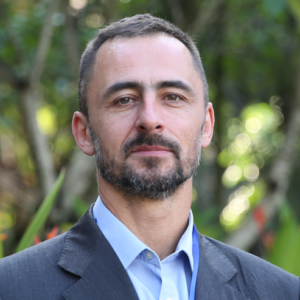
Alan is the Chief Executive of the Regional Studies Association and General Manager of the RSA Europe foundation. He joined both organisations in February 2024, arriving with extensive experience of organisational and professional leadership. Alan’s background is as a geographer and geography educator. He led the Geographical Association (GA) for over 11 years and played an active role in national and international education policy for over 20 years, exerting a considerable influence on the curriculum and professional practice we see in geography education today. Alan’s key responsibilities include strategic and organisational leadership, securing the sustainable development of both the RSA and the RSA Europe foundation and acting as the principal ambassador for each organisation.
Past webinars
The recent literature in regional studies has at least two influential but parallel tracks. In the evolutionary economic geography (EEG) track, much has been written on and debated about knowledge and innovation in regional path development and the role of related variety in regional diversification. In the second and relatively smaller strand of literature linked to the global production networks (GPN) approach, researchers are concerned with how regional actors and assets can be strategically coupled with the competitive dynamics of global production networks. This lecture intends to serve as an initial and sympathetic attempt to pave a “side track” to connect these two parallel strands that can enable researchers on both tracks to engage more explicitly with each other. To do so, I offer a reconceptualization of “regional worlds” as a central concept in regional studies. I argue that both strands of literature are premised on their different conceptions of “regional worlds” of innovation and production – a more endogenous view of regions as “specialized worlds” of production in the EEG track and a more relational view of regions as “interconnected worlds” of production in the GPN literature. Extending further Boschma’s (2017) Regional Studies annual lecture, I believe this reconceptualization of “regional worlds” can allow analytically the possibility of strategic coupling with GPNs as a new form of related variety in regional diversification by highlighting the importance of extra-local/regional linkages and network dynamics. By relating related variety to strategic coupling, this view can potentially reconcile the coexistence of endogenous and exogenous sources of regional transformation. I will end the lecture with some future agenda for theory and practice in regional studies.
Speaker: Professor Henry Wai-chung Yeung, National University of Singapore, Singapore

Henry Wai-chung Yeung is Distinguished Professor at the Department of Geography, National University of Singapore, Co-Director of the Global Production Networks Centre (GPN@NUS), and Director of the JY Pillay Comparative Asia Research Centre in the NUS Global Asia Institute. He is Principal Investigator of a US$4 million strategic grant awarded by the National University of Singapore to establish the GPN@NUS Centre. He is a leading social scientist specializing in theories and the geography of transnational corporations, global production networks and global value chains, East Asian firms and developmental states in the global economy.
Professor Yeung received his BA (First Class) from NUS in 1992 and PhD from the University of Manchester in 1995. He was a recipient of the NUS Outstanding University Researcher Award (1998), Outstanding Researcher Award (2008), and University Research Recognition Award (2018). In December 2017, he was selected by the American Association of Geographers in the United States to receive the AAG Distinguished Scholarship Honors for 2018 “in recognition of his extraordinary scholarship and leadership in the discipline”. Earlier in June 2017, he was conferred the Royal Geographical Society (with IBG) Murchison Award 2017 for “pioneering publications in the field of globalisation”. Professor Yeung has published six authored books, seven edited books, and over 100 journal papers and 50 book chapters across the fields of human geography, urban and regional studies, Asian studies, international business, and political economy. His recent monographs are Strategic Coupling: East Asian Industrial Transformation in the New Global Economy (Cornell Studies in Political Economy Series, Cornell University Press, Ithaca, May 2016) and Global Production Networks: Theorizing Economic Development in an Interconnected World (with Neil Coe, Oxford University Press, Oxford, April 2015). His research has achieved very high impact in the social sciences. The ISI Web of Science database shows that he has 12 journal papers each receiving over 100 citations and his accumulated work has been cited at least 5,100 times in over 3,900 publications (excluding own work) as of January 2020, generating an h-index of at least 34. His citations on Google Scholar have exceeded 19,000. He is Editor of two top journals in Geography since 2001 – Environment and Planning A and Economic Geography and Past Editor of Review of International Political Economy (2004-2013), and serves on the editorial boards of 20 other international journals, including Global Networks, Journal of Economic Geography, and Journal of International Business Studies.
Discussant: Professor Andres Rodriguez-Pose, London School of Economics, UK

Andrés Rodríguez-Pose is a Professor of Economic Geography at the London School of Economics and a part-time Professor of Innovation at the University of Stavanger (Norway). He is past-President of the Regional Science Association International (RSAI). He is a regular advisor to many international organisations, including the European Commission, the World Bank and numerous UN agencies. He was awarded the 2018 ERSA Prize in Regional Science and has been a holder of a European Research Council (ERC) Advanced Grant and of a Royal Society-Wolfson Research Merit Award. In 2019 he received Doctorates Honoris Causa from Utrecht University (the Netherlands) and Jönköping University (Sweden). He is an editor of Economic Geography, and sits on the editorial board of 33 other scholarly journals.
Introduction & Chair: Professor Jennifer Clark, The Ohio State University, USA

Jennifer Clark is Professor and Head of the City and Regional Planning Section at the Knowlton School of Architecture in the College of Engineering at The Ohio State University.
Dr. Clark is a Fellow of the American Association of Geographers (AAG) and a Fellow of the Regional Studies Association (RSA). She is the Deputy Editor-in-Chief of the journal, Regional Studies and recently served as the Chair of the Economic Geography Specialty Group (EGSG) of the AAG (2017-2019). Dr. Clark earned her Ph.D. from Cornell University, a Master’s degree from the Humphrey School of Public Affairs at the University of Minnesota, and a B.A. from Wesleyan University.
Dr. Clark’s most recent book: Uneven Innovation: The Work of Smart Cities (2020) is forthcoming from Columbia University Press. Her other books include: Working Regions: Reconnecting Innovation and Production in the Knowledge Economy (2013), Remaking Regional Economies: Power, Labor, and Firm Strategies in the Knowledge Economy (2007) w/ Susan Christopherson, winner of the Best Book Award from the Regional Studies Association in 2009, and the 3rd edition of Basic Methods of Policy Analysis and Planning (2012) w/ Carl Patton and David Sawicki, a widely adopted text in public policy and urban and regional planning courses. She is also co-editor of the Handbook of Manufacturing Industries in the World Economy (2015) and Transitions in Regional Economic Development (2018). In addition, she has written numerous articles and book chapters.
Dr. Clark researches and teaches courses on urban and regional economic development theory, analysis, and practice as well as research design and methods. She has provided expert testimony before the US Congress and policy advice and consulting to the Organization for Economic Cooperation and Development (OECD) and the Canadian, UK, and US governments. Before joining the Knowlton School, Dr. Clark taught at Cornell University and the Georgia Institute of Technology where she was also the Director of the Center for Urban Innovation.
How will Covid-19 affect business dynamism? All businesses will be impacted by the COVID-19 pandemic, most negatively, some positively. Professor Mark Hart provides an early assessment in this webinar by exploring evidence from previous pandemics and provide an overview of early assessments of the emerging evidence on the business impacts of the COVID-19 pandemic on Chinese firms and other related businesses. Early evidence from the COVID-19 pandemic in China emphasises the severity of the short-term effects on SMEs. The regional implications of Covid-19 in the UK will be explored by examining lessons from the Great Financial Crash and exploring scenarios using a job creation and destruction framework. In addition, the webinar will take an early look at company incorporations and dissolutions in the first quarter of 2020 with the same period in 2019 using the latest available data from Companies House in the UK.
Click here to view the PowerPoint presentation.
Speaker: Professor Mark Hart, Aston University, UK

Mark Hart is the Academic Lead of the Goldman Sachs 10,000 Small Businesses programme in the UK who is Professor of Small Business and Entrepreneurship in Aston Business School. He is also Deputy Director of the national Enterprise Research Centre (www.enterpriseresearch.co.uk) which is jointly hosted at Aston University and the University of Warwick which addresses issues of small business growth. It is funded jointly by the ESRC, BEIS, British Business Bank, Intellectual Property Office and Innovate UK.
Over the last 40 years, Professor Hart has worked and published extensively in the areas of entrepreneurship, enterprise and small business development and policy. He jointly manages the Global Entrepreneurship Monitor (GEM) project in the UK and advises a number of UK Government Departments and the Devolved Administrations on enterprise issues.
His work on High-Growth Firms (HGFs) at Aston has been influential in shaping policy discussions and actions in the UK and he is currently working for NESTA and the OECD on a range of follow-up projects. He has undertaken numerous evaluation studies of business support products and services in the UK and Ireland.
Chair: Professor Heike Mayer, University of Bern, Switzerland

Heike Mayer is professor of economic geography at the University of Bern in Switzerland and an adjunct professor in urban affairs and planning at Virginia Tech in the United States. She is also a member of the University of Bern`s Center for Regional Economic Development (CRED). Her research focusses on dynamics of innovation and entrepreneurship, place making and sustainability. She is currently leading research studies on the role of social innovation in peripheral regions, transformation processes in industrial towns, as well as multilocal work arrangements and digitalization. She is author of the book Entrepreneurship and Innovation in Second Tier Regions (published by Edward Elgar, Cheltenham), co-author of the book Small Town Sustainability (with Prof. Paul L. Knox, Birkhäuser Press, Basel), and co-author of the book The Political Economy of Capital Cities (with Prof. Fritz Sager, Dr. David Kaufmann, Dr. Martin Warland, Routledge, London).
We have shocks, and we have trends, like always in human history. We have just been reminded about our vulnerability to shocks through covid-19 – but when the pandemic exploded many places and people were still struggling to come to terms with the brutal impact of the 2008 economic and financial crisis: shocks can change the world (or better, parts of it) for a very long time, and some places may never recovered, prompting new questions and the set-up of new priorities and agendas. On the other hand, shocks occur in the context of global megatrends – including technological paradigm shifts and economic globalisation – which transform and shape the way we live, providing new opportunities for development. However, these same global megatrends can also be highly divisive and, interacting with shocks, pose huge challenges for social cohesion, political and economic equity, sustainability, and even peaceful coexistence.
History matters, and, as we all know, historical paths are geographically-specific at all layers of geography. Shocks are spatially asymmetric, and trends have heterogeneous impact on places.
The starting questions here today are the following: What can we learn from history? Do we learn from history or not? Is the present different from the past, and how?
Speakers:
Dr Joaquim Oliveira Martins, OECD Centre for Entrepreneurship, SMEs, Regions and Cities, France

Joaquim Oliveira Martins is currently Deputy-Director of the OECD Centre for Entrepreneurship, SMEs, Regions and Cities focusing on Entrepreneurship & SMEs policies; Regional, Rural and Urban policies; and Tourism. He was previously Head of the OECD Regional Development Policy Division and supervised projects on regional and urban economics, governance, regional statistics and well-being. He was Head of the OECD Structural Economic Statistics Division, where he focused on Trade & Globalisation studies, Productivity measurement and Business statistics. He is author of many academic articles and OECD publications. When Senior Economist at the OECD Economics Department, he coordinated and authored reports on Policy Response to the Threat of Global Warming, Competition, Regulation and Performance, Ageing & Growth, Investment in Tertiary Education, and Public Health Expenditure Projections. He was also Head of Desk for Emerging markets, in charge of the first OECD Economic Surveys of Brazil, Chile and several transition countries. Before the OECD, he was Research Fellow at the Centre d’Etudes Prospectives et d’Informations Internationales (CEPII, Paris). He holds a MSc in Econometrics and a PhD in Economics from the University of Paris-I, Panthéon-Sorbonne, and is currently Associate Professor at the University of Paris-Dauphine PSL and Fellow of the Academy of Social Sciences, UK (FAcSS).
Dr Sergio Petralia, Utrecht University, The Netherlands and London School of Economics, UK

Sergio Petralia is an assistant professor at Utrecht University. He is also an affiliated researcher at the London School of Economics and Political Science and the CID Growth Lab at Harvard University. He is currently working on the economic and spatial effects of disruptive technological change. Most recent research projects study the emergence and spatial concentration of new technologies using historical data on patent activity, and the impact of disruptive technological change on income and wages. Sergio holds a Bachelors in Economics from the University of Buenos Aires, a Masters in Economics from the University of San Andres in Buenos Aires, and Msc in Economics from Pennsylvania State University in the US. He finished his Ph.D. at Utrecht University in 2017.
Professor Elisa Giuliani, University of Pisa, Italy

Elisa Giuliani is Professor at the University of Pisa where she directs the Responsible Management Research Center (REMARC). She has conducted research at the interface of economic geography and innovation studies and she is currently investigating the geography of (ir)responsible capitalism. She is Editor of Research Policy and in the Editorial Boards of Journal of Economic Geography and Economic Geography.
Chair: Professor Simona Immarino, London School of Economics, UK

Simona Iammarino is Professor of Economic Geography at the Department of Geography & Environment of the London School of Economics and Political Science. She served as Head of Department (2014–2017), and is an academic member of the LSE Council and Court of Governors (2016-2022, 2nd term). She is also an Affiliate Faculty Member at the Gran Sasso Science Institute (GSSI) – Social Science, L’Aquila, Italy. Simona’s main research interests lie in the following areas: Multinational corporations, location and innovation strategies, and local impacts; Geography of innovation and technological change; Regional and local economic development and policy. She was co-editor of Regional Studies (2008-2013). She has published more than 50 articles in major peer-reviewed journals, two co-authored books, around 30 book chapters, and numerous working papers, policy reports and other publications. Simona has a long-term experience in externally funded international research projects, and in consultancy projects for various international organisations (e.g. EU Commission, OECD, United Nations) and government agencies.
Over the last 30 years, Professor Simon Dalby has been a pioneer in the field of critical geopolitics and specifically in environmental security and latterly Anthropocene geopolitics. Our conversation is an opportunity to reflect on how his academic and public-facing interests have shifted due to circumstances and events such as the end of the Cold War, the War on Terror, financial crises, and epidemics, including the COVID-19 pandemic. He has not hesitated to critique those who peddle geographical and ecological simplicities. Professor Dalby’s concern with how the geopolitical world of nation states and borders sits awkwardly and violently with planetary boundaries, systems and thresholds remains undimmed. Is he optimistic about our common future?
Speaker: Professor Simon Dalby, Wilfrid Laurier University, Canada

Simon Dalby is a Professor of Geography and Environmental Studies at Wilfrid Laurier University. His published research deals with climate change, environmental security and geopolitics.
He is author of Anthropocene Geopolitics: Globalization, Security, Sustainability, (University of Ottawa Press, 2020) and Security and Environmental Change (Polity, 2009), and co-editor of Achieving the Sustainable Development Goals (Routledge 2019), and Reframing Climate Change: Constructing Ecological Geopolitics (Routledge 2016).
Simon Dalby was educated at Trinity College Dublin, the University of Victoria and holds a Ph.D. from Simon Fraser University. Before joining the Balsillie School he was Professor of Geography, Environmental Studies and Political Economy at Carleton University in Ottawa.
Chair: Klaus Dodds, Royal Holloway University of London, UK and Editor-in-Chief, Territory, Politics, Governance

Professor Klaus Dodds is the Director of Research for the Department of Geography at Royal Holloway. He was awarded the Philip Leverhulme Prize for his achievements in the fields of geopolitics and human geography. In academic year 2010-11, he was a visiting fellow at St Cross College, Oxford and HARC fellow at Royal Holloway. In October 2012, he was elected Academician (now Fellow) of the Academy of Social Sciences (FAcSS). In November 2016, he was awarded a Major Research Fellowship by the Leverhulme Trust (2017-2020) for a project examining ‘A new North? The making and remaking of the global Arctic’. In academic year 2017-18, he is a visiting fellow at St John’s College, Oxford. He researches in the areas of geopolitics and security, media/popular culture (esepcially on film theory) and the international governance of the Antarctic and the Arctic.
This webinar is organised in collaboration between the OECD Spatial Productivity Lab at the OECD Trento Centre for Local Development (an integral part of Centre for Entrepreneurship, SMEs, Regions and Cities) and the Regional Studies Association. The webinar is the 9th Meeting of the OECD Spatial Productivity Lab and part of the RSA’s Regions Cities Industry Webinar Series.
Resources:
Homeworking in the UK, Darja Reuschke
Who can Telework Today? The Teleworkability of Occupations in the EU
Speakers:
Dr Matteo Sostero, Economist, European Commission, Joint Research Centre, Spain

Matteo Sostero is a researcher at the Joint Research Centre (JRC) of the European Commission in Seville. He holds a Ph.D in Economics from the Sant’Anna School of Advanced Studies in Pisa, Italy. His research interests are in labour economics, especially the impact of technology on jobs and working conditions, as well as data science and data visualisation.
Teleworkability and the COVID-19 Crisis: A New Digital Divide?
Dr Darja Reuschke, Associate Professor in Human Geography, University of Southampton, UK

Darja Reuschke is Associate Professor in Human Geography at the University of Southampton. Her research focuses on homeworking, home-based businesses and self-employment.
Homeworking and its Effect on Productivity and Wellbeing
Professor Patricia Mokhtarain, Professor of Civil & Environmental Engineering (Transportation), Georgia Institute of Technology, USA

Patricia Mokhtarian is the Susan G. and Christopher D. Pappas Professor of Civil and Environmental Engineering (CEE) at the Georgia Institute of Technology. She joined Georgia Tech in 2013, after 23 years at the University of California, Davis. Before that, she spent nine years in regional planning and consulting in Southern California, after completing her PhD at Northwestern University. Dr. Mokhtarian has specialized in the application of rigorous quantitative methods to the study of travel behavior for more than 40 years, and a key research interest has been the impact of telecommunications technology on travel behavior. She has authored or co-authored more than 200 refereed journal articles, technical reports, and other publications, including more than 40 peer-reviewed articles relating to teleworking. She is a recent Past Chair of the International Association for Travel Behaviour Research, and serves on the editorial boards of nine transportation journals.
Teleworking and Mobility: What do we (think we) know and not know?
Mattia Corbetta, Policy Analyst, OECD Trento Centre for Local Development, Italy

Mattia Corbetta is a Policy Analyst at the OECD Trento Centre for Local Development. Between 2012 and 2019 he worked as a Policy Adviser at the Italian Ministry of Economic Development, where he contributed to designing the Italian Startup Act, the National Plan on Industry 4.0 and other policies on digital and inclusive entrepreneurship. In the past, he worked at the Italian Chambers of Commerce in Switzerland and Morocco, at the Italian Embassy in Syria and at the UN Volunteers program in Germany. He graduated in International Relations at LUISS Guido Carli, Rome, gained a MA in Business & Trade in MENA at the University of Perugia and a MA in Contemporary History at the University of Bologna.
Exploring Policy Options on Teleworking
Chair: Dr John Harrison, Reader in Human Geography, Loughborough University, UK

John works at Loughborough University in the UK. He is a regional geographer interested in the planning and governance of cities and regions in globalisation. John has been an Editor of Regional Studies since 2013, first as its inaugural Early Career Editor and then section editor for ‘Urban and Regional Horizons’.
His recent publications include the Handbook on the Geographies of Regions and Territories (with Anssi Paasi and Martin Jones), Doing Global Urban Research (with Michael Hoyler) and Metropolitan Regions, Planning and Governance (with Karsten Zimmermann and Daniel Galland), and he is currently co-editing a forthcoming special issue of Regional Studies on Planning Regional Futures (with Mark Tewdwr-Jones and Daniel Galland).
Global Value Chains and Foreign Direct Investment create both opportunities and challenges for cities and regions. The pandemic has deeply affected consolidated internationalisation patterns and the local impacts of these global forces. Regional recovery needs to leverage all possible opportunities offered by the new global order. This calls for a reconsideration of existing policy tools and for evidence-based discussions on policies that work on the ground to promote regional recovery and development.
The Policy Panel will discuss how public policies for cities and regions (including Smart Specialisation) should evolve in response to a global economy in constant transformation and how Global Value Chains and FDI can be successfully leveraged by local policy makers.
Speakers
Professor Riccardo Crescenzi, London School of Economics, UK

Professor Riccardo Crescenzi is a Full Professor of Economic Geography at the London School of Economics where he is also affiliated with the Centre for Economic Performance (CEP) and the Spatial Economics Research Centre (SERC). Riccardo is the current holder of a European Research Council (ERC) Grant. He is also an Associate at the Centre for International Development at the Harvard Kennedy School of Government, Harvard University. He has been a Visiting Scholar at the Harvard Kennedy School of Government’s Taubman Centre, at the University of California Los Angeles (UCLA) and a Jean Monnet Fellow at the European University Institute. Riccardo has provided academic advice to, amongst others, the European Investment Bank (EIB), the European Parliament, the European Commission, the Inter-American Investment Bank (IADB), the Organisation for Economic Co-operation and Development (OECD), the World Bank and various national and regional governments. Riccardo is the 2017 recipient of the Geoffrey J.D. Hewings Award from the North American Regional Science Council. His research is focused on Regional Economic Development and Growth, Innovation, Foreign Direct Investment, Global Value Chains and the analysis and evaluation of European Union policies.
Dr. Austin Kilroy, World Bank, Croatia

Austin’s responsibilities as a staff in the Finance, Competitiveness and Innovation Global Practice in the Europe and Central Asia region have focused on: team leader for an advisory service on regional economic development in Eastern Croatia (involving 90 people from 12 departments of the Bank); team leader for a technical assistance project to approximately 150 municipalities in six countries of the Eastern Partnership; and previously team member for support to the Government of Croatia on cluster competitiveness as part of their smart specialization strategy. Austin joined the Bank in 2010, and since then has worked on lending operations, analytic work, and technical assistance in Europe, Africa, and Asia. He is a main author of the Bank’s report on ‘Competitive Cities for Jobs and Growth’. Before coming to the World Bank, Austin worked in an architectural start-up in Beijing, NGOs in France and the UK, and in politics for the Leader of the Liberal Democrat party in the House of Lords in London. He has a PhD in regional and urban economics from Massachusetts Institute of Technology, USA, where he was a Fulbright Scholar, and a BA in Economics and Politics from the University of Cambridge, UK.
Dr. Sara Amoroso, European Commission, Joint Research Centre, Spain

Sara Amoroso is an economist at the Joint Research Center (JRC), European Commission, Spain, since 2013. Her research focuses on industrial innovation and innovation policy. Her main topics of interest are foreign direct investment, firm dynamics, and innovation networks. She is an associated editor of the Journal of Technology Transfer. Her research has been published in journals such as Small Business Economics, Economics of Innovation and New Technology, and Science and Public Policy. She has recently published a co-edited volume on “Science and Technology Parks and Regional Economic Development: An International Perspective”.
Dr. Alexander Lembcke, OECD, Centre for Entrepreneurship, SMEs, Regions and Cities, France

Alexander C. Lembcke is an Economist and Policy Analyst at the OECD’s Centre for Entrepreneurship, SMEs, Regions and Cities where he leads the quantitative analysis of regional and urban business and labour dynamics. His work covers the economic analysis of productivity, transport infrastructure and innovation in cities and regions with a focus on the role of SMEs and entrepreneurship. He occasionally published academically and was and is responsible for several OECD publications including the recent reports on “Productivity and Jobs in a Globalised World: (How) Can All Regions Benefit?”, “Broadening Innovation Policy for all Regions and Cities” and “Benefiting from Accessibility in Cities and Regions”.
Chair: Dr. Peter Wostner, Institute of Macroeconomic Analysis and Development, Republic of Slovenia

Dr. Peter Wostner is an expert on development, competitiveness and territorial policies, EU budget and EU Cohesion Policy where he has been, for over 15 years, directly involved in the EU budget and regulatory negotiations as well as setting up of the programming framework and implementation arrangements, including design of (RTDI, competitiveness and HR) policy instruments.
He has been the driver of setting up of Slovenian clusters, the Strategic Research and Innovation Partnerships in the function of head of the Smart Specialisation Unit responsible for policy coordination of innovation related activities within the Slovenian Government between 2014 and 2019.
Currently he works as senior analyst dealing with productivity, digital and structural transformation as well as territorial dimension at the Institute of Macroeconomic Analysis and Development. He is a lecturer, moderator and an author of number of articles, especially on the EU budget, development and Cohesion policy.
Dr. Wostner is also the chairman of the OECD’s Working Party on Rural Policy and Vice-Chair of the Regional Development Policy Committee.
Thought leaders throughout the world have been calling for a Green New Deal as a post-Covid-19 recovery strategy. The goals are threefold: protecting the environment and reduce greenhouse gas emissions; build an economy based on renewable energy and related clean technologies, and to do both in ways that promote greater equity for those who have borne the brunt of environmental harms and limited economic opportunity. Our panellists explore the elements of a Green New Deal on three continents Europe, North America and South America.
Professor Joan Fitzgerald, NNortheastern University, USA

Prof. Fitzgerald’s latest book is Greenovation: Urban Leadership on Climate Change (Oxford Univ. Press, 2020), which examines leading practices in North America and Europe. Her article, Cities on the Frontlines, appeared in a special issue of the American Prospect on the Green New Deal in December 2019. She published this op-ed as a leading expert to the C-40 Cities Global Mayors COVID-19 Recovery Task Force.
Dr. Rogério Studart, The New Climate Economy at the World Resources Institute, USA

Rogério Studart is a senior fellow of the World Resources Institute, currently working on the new climate economy, an initiative to promote policies guided by evidence-based analysis of costs, benefits, and opportunities of the much-needed transitions to low-carbon growth.
Dr. Studart is a non-resident fellow of Brazil’s Center of International Relations – CEBRI and a distinguished fellow at the Global Federation of Competitiveness Councils. Previously he was an executive director to the World Bank Group, representing Brazil and eight other nations. In this capacity in different years, he was a member of every executive board committee, represented Brazil at the meetings of the g-20 and other international forums.
Dr. Studart was also Executive Director for Brazil and Suriname at the Inter-American Development Bank Group (IADB), having acted as chairman of several of its board committees. He has also held positions with the United Nations in Santiago, Chile, and in Geneva, Switzerland, and at the Chase Manhattan Bank of Brazil.
Dr. Studart is an economist by profession and holds a Ph.D. from the University of London, England.
He is an award-winning scholar, published books and several articles on macroeconomics, finance, and development finance, and columns in different news media around the world.
Chris Goodall, Carbon Commentary, UK

Chris Goodall is a businessperson and author. He writes about the transition towards net zero, particularly the technologies that will be used. His most recent book was about the UK in particular. ‘What We Need To Do Now’ was on the shortlist for the Wainwright prize. It offers an outline plan for full decarbonisation. He was chair of one of the UK’s fastest growing car charging companies which was sold to Engie in the summer of last year.
Chair: Dr. Will Eadson, Centre for Regional Economic and Social Research (CRESR), Sheffield Hallam University, UK

Will Eadson is a Reader in Urban Sustainability Policy at the Centre for Regional Economic and Social Research (CRESR), Sheffield Hallam University. He has a longstanding record of research and publications in the field of urban and regional sustainability policy, with a particular focus on the social and spatial justice implications of sustainability-related policy. This has included research for EU, national, regional and local government, research funders and large charities. His current research and writing focuses on two themes: economic geographies of sustainability transitions; and understanding democracy in theory and practice in sustainability transitions. Will is RSA Yorkshire and Humber branch chair and an Associate Editor of Regional Studies, Regional Science. He is also Editor (Environment and Society section) of Geography Compass journal.
Entrepreneurship can promote economic performance in a variety of ways, short-term and in the longer run. A key finding of recent empirical studies is that high regional levels of entrepreneurship in terms of self-employment and new business formation tend to be rather persistent and can last for decades or even more than a century. A long tradition of regional entrepreneurship is often associated with certain mentalities and basic values of the population. Such a tradition or ‘culture’ of entrepreneurship can shape the ability of a regional economy to cope with external challenges such as national or global crises. I summarize research on long-term persistence and effects of entrepreneurship, discuss policy implications, and identify important avenues for further research.
Speaker: Professor Michael Fritsch, Friedrich Schiller University Jena, Germany

Michael Fritsch is Senior Professor of Economics at the Friedrich Schiller University Jena, Germany, and Research Professor at the Halle Institute for Economic Research (IWH). He is also Associate Editor of the academic journals Regional Studies and Small Business Economics. Michael Fritsch has received his degrees in economics (Diplom Volkswirt, Ph.D., Habilitation) from the Technical University of Berlin. From 1992-2006, he was Chair of Economic Policy at the Technical University Bergakademie Freiberg, and from 2006-2018 Chair of Business Dynamics, Innovation, and Economic Change at the Friedrich Schiller University Jena.
Michael Fritsch has published more than two hundred academic articles in scholarly journals and edited volumes as well as diverse books. His main fields of research are new business formation processes and their impact on economic development, innovation behaviour, innovation systems, and economic development strategies. A main topic of his recent research is the role of historical factors that shape the long-term development trajectories of regions. This particularly includes the role of informal institutions such as a regional culture of entrepreneurship.
Speaker: Michael Wyrwich, University of Groningen, The Netherlands

Dr. Michael Wyrwich is Associate Professor for Small Business & Entrepreneurship at the Department of Innovation Management & Strategy at Rijksuniversiteit Groningen (Netherlands). Furthermore, he is adjunct lecturer at the Friedrich Schiller University Jena (Germany) where he also obtained his PhD and habilitation degree in Economics. Currently he is also serving as a principle investigator of the project “The socioeconomic heritage of the innovation system of the socialist German Democratic Republic (GDR) across East German regions,“ which is funded by the German Federal Ministry of Education Research.
Michael’s research interests and teaching focus cover diverse topics in the area of entrepreneurship, innovation (systems), and regional development. In his work, he often takes a comparative and interdisciplinary perspective and considers the historical, institutional and environmental context. His articles were published in major journals in economics, management, and geography.
Discussant: Professor David B. Audretsch, Indiana University, USA

David Audretsch is a Distinguished Professor and Ameritech Chair of Economic Development at Indiana University, where he is also serves as Director of the Institute for Development Strategies. He also is a part-time Professor at the Department of Innovation Management and Entrepreneurship, University of Klagenfurt, Austria and an Honorary Professor of Industrial Economics and Entrepreneurship at the WHU-Otto Beisheim School of Management in Germany.
Audretsch’s research has focused on the links between entrepreneurship, government policy, innovation, economic development and global competitiveness. He is co-author of The Seven Secrets of Germany, published by Oxford University Press. He is co-founder and Editor-in-Chief of Small Business Economics: An Entrepreneurship Journal. He was awarded the Global Award for Entrepreneurship Research by the Swedish Foundation for Entrepreneurship. He has received honorary doctorate degrees from the University of Augsburg, Jonköping University and the University of Siegen. Audretsch also was awarded the Schumpeter Prize from the University of Wuppertal.
Audretsch has consulted with numerous international organizations, including the World Bank, OECD, European Union and the United Nations. He currently serves as a member of the Advisory Board to a number of research and policy institutes, including the Swedish Entrepreneurship Forum in Stockholm, the Jackstädt Centre for Entrepreneurship in Wuppertal, Germany, and the American Center for Entrepreneurship in Washington, D.C.
Chair: Professor Maryann Feldman, University of North Carolina at Chapel Hill, USA

Maryann P. Feldman is the Heninger Distinguished Professor in the Department of Public Policy at the University of North Carolina, an Adjunct Professor of Finance at Kenan-Flagler Business School and a Research Director at UNC Kenan Institute of Private Enterprise. Her research and teaching interests focus on the areas of innovation, the commercialization of academic research and the factors that promote technological change and economic growth. Dr. Feldman is an editor of the journal, Research Policy.
Dr. Feldman was the winner of the 2013 Global Award for Entrepreneurship Research for her contributions to the study of the geography of innovation and the role of entrepreneurial activity in the formation of regional industry clusters. Her dissertation, Geography of Innovation, examined the spatial distribution of industrial innovation and provided an empirical model of the factors and resources that affected the production of new product innovation. This publication is noted to be the first time that the term “geography” was used to describe spatial phenomenon and is now an accepted lexicon. Currently, the geography of innovation is a subject area under the strategy division of the Academy of Management.
From 2014-2017, Dr. Feldman held a joint appointment at the National Science Foundation as the Science of Science and Innovation Policy (SciSIP) Program Director and chaired an inter-agency working group on Science Policy.
Feldman’s early work revealed that universities were necessary, but not sufficient, for technology-based economic development. These findings launched a new area of investigation into university technology transfer. She has written extensively on the process and mechanics of the commercialization of academic research. Feldman’s most recent work explores emerging industries, entrepreneurship and the process of regional transformation – topics covered in the edited book, Cluster Genesis: the origins of technology-based economic development. She has written extensively on the early development and growth of biotechnology, as an example of a transformative technology. In 2010, she completed a study of the industrial applications of optical science, which demonstrated typologies of places that were able to sustain industrial optics through a variety of economic development strategies.
Currently, Feldman is actively engaged in researching the industrial genesis of the Research Triangle region, in a joint project with Nichola Lowe. The project follows the development of the regional economy over a 50 year time period using a unique database of 3200 entrepreneurial ventures and attempts to understand the institutional dynamics that created a vibrant regional economy. This research approach is being replicated in other entrepreneurially active regions including: Sophia Antipolis, France; Austin, TX; and Chatanooga, TN.
Feldman is a prolific writer whose work appears in numerous journals, including: Management Science, Organization Science, Research Policy, The Journal of Technology Transfer, American Economic Review, The Review of Economics and Statistics, Annals of the Association of American Geographers, Economic Geography, and The Brookings Papers on Economic Policy.
Uneven development—broadly defined as the unequal distribution of people, resources, and wealth—is a, if not the, fundamental characteristic of human geography. Uneven development is located and evidenced at global, regional, national, urban, and suburban spatial scales, such that it is combined and compounded for some people and places more than others. Patterns of uneven development indeed mark the times and spaces of human history and have provided the rich basis for theoretical developments in human geography and the social sciences more broadly. This webinar seeks to get behind the rise and possible fall of uneven development through an in conversation dialogue between Jamie Peck and Marion Werner. It will focus on: how the authors have encountered uneven development in their academic careers; how they have used uneven development narratives in their research over time; and where they see academic and policy debates heading on the unequal shape of contemporary capitalism.
Speakers:
Professor Jamie Peck, University of British Columbia, Canada

Jamie Peck is Canada Research Chair in Urban & Regional Political Economy and Professor of Geography at the University of British Columbia, Canada, where he is a Distinguished University Scholar. With long-term research interests in urban restructuring, geographical political economy, labor studies, the politics of policy formation and mobility, and economic geography, his current research is focused on the political economy of neoliberalization and capitalist transformations in South China. Jamie Peck’s recent books include Doreen Massey: critical dialogues (2018, Agenda, coedited with Marion Werner, Rebecca Lave and Brett Christophers); Offshore: Exploring the worlds of global outsourcing (2017, Oxford University Press); and Fast Policy: Experimental statecraft at the thresholds of neoliberalism (2015, University of Minnesota Press, with Nik Theodore).
Dr Marion Werner, University at Buffalo, SUNY, USA

Marion Werner is an Associate Professor in the Department of Geography at the University at Buffalo, SUNY. Her research is located at the nexus of critical development studies, feminist theory, and political economy with a focus on Latin America and the Caribbean.
Chair: Professor Martin Jones, Staffordshire University, UK

Martin (Deputy Vice Chancellor and Professor of Human Geography, Staffordshire University) works at Staffordshire University, with responsibility for Research, Academic and Strategic Planning, the Student Experience, and SU Academy Trust. Martin joined the University in May 2017 from the Department of Geography at the University of Sheffield, where he was Director of the White Rose Social Science Doctoral Training Centre and Professor of Urban and Regional Political Economy.
Prior to this Martin worked at Aberystwyth University as the Pro Vice-Chancellor for Research and Co-Director of the Wales Institute of Social and Economic Research, Data and Methods (WISERD).
Martin is an interdisciplinary researcher, working in the broad area of society and space and specifically on the interface between economic and political geography through economic development and governance. His current research, funded through WISERD and the ESRC, is looking at city-region building and the Foundational Economy in Wales and England. He has been a member of the Regional Studies Association for 25 years and is the originator and co-editor of the journal Territorial, Politics, Governance.
During his career Martin has been a member of some 300+ interview panels, chairing some 150 of these, appointing to a wide range of teaching, research and professional services positions, and ranging from those in the early stages of their careers to executive postholders.
Globally there is an on-going debate on which types of policies and programmes are most appropriate to improve human welfare and boost the economies of cities, regions and communities that are lagging behind. Often this debate is framed as a dichotomy between place-based policies on the one hand, and people-based policies on the other. This Webinar reports on the outcomes of the RSA’s Policy Expo into place-based policy in the 21st Century. The Expo set out to understand those elements that are seen to constitute good practice in place-based policy in the 21st Century by drawing on the published literature, as well as the perspectives of both the academic community and policy makers. Some of the headline findings from this Expo include the:
- ubiquity of place-based policies, with examples found across developed and developing economies, and across policy domains as diverse as economic development, health and social welfare, as well as environmental management;
- strong influence of institutional dynamics on the roll-out and success of place-based policies;
- heightened awareness amongst academics, but a lack of insight amongst policy makers, around the importance of how place-based policies are implemented and the associated need for governments to gather the support of communities, and especially local leaders, if they are to achieve their goals; and,
- potential to improve future place-based policies by considering – and incorporating into programme designs – ten success factors.
Finally, the Webinar seeks to open up the debate on place-based policy across the academic and policy community. It seeks to stimulate a search for new and more impactful policy prescriptions in order to ensure the more effective use of scarce public-sector resources and advance the wellbeing of the most disadvantaged and deliver a sustainable future.
Click here to find out more about the Policy Expo.
Click here to find out more about the Policy Expo Grant Scheme.
Speaker: Andrew Beer, University of South Australia, Australia

Andrew Beer is the Executive Dean of UniSA Business. He comes to this role after working previously as the Dean of Research and Innovation, at the UniSA Business School. Prior to commencing with UniSA in 2016, Andrew worked at the University of Adelaide and the Flinders University. He holds a Bachelor of Arts from the University of Adelaide and a PhD from the Australian National University.
Professor Beer has served as a Research Fellow at the University of Plymouth, a Leverhulme Fellow at the University of Ulster and a Visiting Professor at the University of North Texas. He was the Chair of the South Australian Government’s Homelessness Strategic Group from 2011 to 2017, and is a Fellow of the Regional Australia Institute. He served on the College of Experts for the Australian Research Council and is a Fellow of the UK’s Academy of Social Sciences. Professor Beer was Chair of the Regional Studies Association from November 2013 to November 2017.
His research interests include the operation and functioning of Australia’s housing markets (including the provision of housing for persons with a disability), the drivers of regional growth, structural change within the economy and the impacts of an ageing population. He is currently undertaking research in four major areas: the outcomes of the closure of the Australian automotive industry; the cross national analysis of the leadership of places; the quality and condition of Australia’s housing stock; and the use of services and housing by Australia’s ageing population. Currently he is collaborating with Professor Markku Sotarauta of Tampere University, Finland as a joint editor on the Handbook of City and Regional Leadership (Edward Elgar) and is in the process of completing a Policy Expo for the Regional Studies Association on place based policy
Speaker/Chair: Fiona McKenzie, Office of the Commissioner for Environmental Sustainability, Victorian Government, Australia

Fiona McKenzie is a Principal Science Writer for the Victorian Government Commissioner for Environmental Sustainability in Melbourne Australia.
Fiona has more than 25 years experience in applied socio-economic and spatial research within government. She has authored more than 50 research reports including government publications and journal articles. Topics covered include: regional population trends such as youth migration and ageing; implications of regional economic change, and community impacts of drought and flood. Her current role involves bringing social science perspectives to State of Environment reporting.
Fiona’s university qualifications include a recently-completed PhD from the University of South Australia, a Masters degree in Geography from the University of Melbourne and a Masters degree in Regional and Urban Planning Studies from the London School of Economics. She is a Fellow of the Regional Studies Association and the Royal Geographical Society.
The webinar will focus on how the current pandemic and other megatrends are affecting health, well-being and economic conditions in regions and cities across OECD countries. Two presentations will provide evidence and insights on the main factors of regional resilience to external shocks. Paolo Veneri, Head of Territorial Analysis and Statistics at the OECD, will present on the latest edition of OECD Regions and Cities at a Glance report, which provides a comprehensive assessment on the state of regions and cities in OECD countries. Topics will include health, economic conditions and climate change. Professor Andres Rodriguez-Pose, London School of Economics, will present how regions are able to adopt the drivers of resilience in response to the current pandemic. The following discussion will allow participants and speakers to share insights on how the current crisis and other megatrends may shape new patterns of geographical socio-economic disparities and how this can be addressed.
Speakers:
Paolo Veneri, OECD, France

Paolo Veneri is the Head of the Regional Analysis and Statistics Unit at the OECD Centre for Entrepreneurship, SMEs, Regions and Cities. His work covers several topics connected to urban and regional development, including global urbanisation, migration, well-being measurement, and spatial inequalities. He was and is responsible for several OECD thematic publications including the forthcoming “Cities in the World. A New perspective on urbanisation”, “Regions and Cities at a Glance” editions, “Divided Cities” (2018), “The Geography of Firm Dynamics” (2017), “Making cities work for all” (2016), “How’s Life in your Region?” (2014) and “Rural-urban partnerships: an integrated approach to economic development” (2013). He holds a PhD in Economics and he has published several papers in academic journals within the field of urban economics and regional studies.
Andrés Rodríguez-Pose, London School of Economics, UK

Andrés Rodríguez-Pose is a Professor of Economic Geography at the London School of Economics and a part-time Professor of Innovation at the University of Stavanger (Norway). He is past-President of the Regional Science Association International (RSAI). He is a regular advisor to many international organisations, including the European Commission, the World Bank and numerous UN agencies. He was awarded the 2018 ERSA Prize in Regional Science and has been a holder of a European Research Council (ERC) Advanced Grant and of a Royal Society-Wolfson Research Merit Award. In 2019 he received Doctorates Honoris Causa from Utrecht University (the Netherlands) and Jönköping University (Sweden). He is an editor of Economic Geography, and sits on the editorial board of 33 other scholarly journals.
Chair: Rhiannon Pugh, CIRCLE, Lund University, Sweden

Rhiannon Pugh is a senior lecturer in Innovation Studies, CIRCLE, Lund University. She has a background in regional economic geography and is a regular participant in RSA activities. She is early career section editor for Regional Studies, Regional Sciences which is currently seeking submissions from
In this webinar featuring an RSA-sponsored new book The Belt and Road Initiative (BRI) as Epochal Regionalisation, author Xiangming Chen will discuss the book’s framework for understanding the BRI’s large-scale and cross-border regional corridors and sub-corridors that have strong connected impacts on globalization, urbanization and development. He will focus on the Djibouti-Ethiopia development corridor as a complex case illustrating the opportunities and challenges for urban and regional development from combining the local adaptation of China’s Port-Park-City (PPC) mode of development, special zone-based industrialization and trans-border freight logistics within and between Djibouti and Ethiopia.
Click here to find out more about the Policy Expo.
Click here to find out more about the Policy Expo Grant Scheme.
Speaker: Xiangming Chen, Trinity College, USA

Xiangming Chen served as the Dean and Director of the Center for Urban and Global Studies at Trinity College, Connecticut during 2007-2019. He is currently the Paul E. Raether Distinguished Professor of Global Urban Studies and Sociology at Trinity College and a distinguished guest professor at Fudan University in Shanghai and an adjunct professor at the Shanghai Academy of Social Sciences. His research focuses primarily on intersections between cities, special economic zones and the global economy. He is a co-author, with Anthony Orum, of The World of Cities: Places in Comparative and Historical Perspective (Blackwell, 2003); the author of As Borders Bend: Transnational Spaces on the Pacific Rim (Rowman and Littlefield, 2005); the editor of and primary contributor to Shanghai Rising: State Power and Local Transformations in a Global Megacity (University of Minnesota Press, 2009); the lead editor, with Ahmed Kanna, of Rethinking Global Urbanism: Comparative Insights from Secondary Cities (Routledge, 2012); a co-author, with Anthony Orum and Krista Paulsen, of Introduction to Cities: How Place and Space Shape Human Experience(Wiley-Blackwell, 2012); the lead editor, with Nick Bacon, of Confronting Urban Legacy: Rediscovering Hartford and New England’s Forgotten Cities (Lexington Books, 2013); and a co-editor, with Sharon Zukin and Philip Kasinitz, of Global Cities, Local Streets: Everyday Diversity from New York to Shanghai (Routledge, 2015; Chinese edition, 2017; Korean edition, 2017). He has conducted policy research and constancy for UNCTAD, the World Bank, the Asian Development Bank and OECD.
Discussant: Vanessa T. Tang, University of KwaZulu-Natal, South Africa

Vanessa Tang is a senior policy development consultant and lectures international economics at the University of KwaZulu-Natal, RSA. She has consulted for various local and international organizations including the National Research Foundation, KwaZulu-Natal Economic Development, Tourism and Environmental Affairs, African Development Bank, African Union and African Capacity Building Foundation. She has published numerous papers in government reports, journals and books on issues related to international trade, welfare, tourism, special economic zones and regional economic integration. Her most recent co-edited books are titled Comparative Regionalisms for Development in the 21st Century- Insights from the Global South, published by Routledge, UK and Development and Sustainable Growth of Mauritius, published by Palgrave Macmillan, USA.
Chair: Tyanai Masiya, University of Pretoria, South Africa

Tyanai Masiya is a Senior Lecturer at the School of Public Management and Administration, University of Pretoria. He has written extensively around issues of citizenship and democracy in Zimbabwe, including constitutionalism, democratisation, elections as well as transparency and accountability of the state. Beyond issues of the state, Dr Masiya’s areas of interest also include local government management and service delivery and has research publications around issues of citizenship and democracy at municipal level. Of specific interest to his research work are institutional innovations in municipal governance that enhance public participation for improved service delivery.
This webinar offers a brief reflection on the new policy challenges that have emerged because of the COVID-19 pandemic. The crisis revealed how important are certain public goods, produced by social interactions in a decentralized manner, for the functioning of our societies. It is about knowledge, creativity, health, trust, security, or culture. Because they were dramatically reduced or modified for a while, we realized how important they are. This is an opportunity to build back better and be aware on how to support/promote the decentralized production of these essential public goods.
We touch upon the notion of ‘new normal’ and look at lessons that can be learned from this crisis in areas that were topical before the outbreak and are likely to be even more so after it. These include the need to steer digital transformation to minimize negative impacts on jobs and sectors while critically reflecting on their ‘essentiality’. We reflect on the essential (low tech) services that cannot be carried out online have in fact be continuing as “normal” at higher risk. But also, essential services such as creative industries, culture and arts that cannot be fully delivered online either and are likely to affect the long terms opportunities to innovate and nurture the social tissues of society. We propose what can be done about this.
Speaker(s):
Joaquim Oliveira Martins, CEPII, France

Joaquim Oliveira Martins is Counsellor at the Center for Prospective Studies and International Information (CEPII, Paris) and Lecturer at the University of Paris Dauphine-PSL. Previously, he was Deputy-Director of the OECD Centre for Entrepreneurship, SMEs, Regions and Cities. He authored academic articles and OECD publications on trade & competition, productivity & growth, environment, structural policy complementarities and regional policies. He holds a PhD in Economics from the University of Paris-I, Panthéon-Sorbonne, and is Fellow of the Academy of Social Sciences, UK (FAcSS).
CEPII-Center for Prospective Studies and International Information: joaquim.oliveira@cepii.fr
www.researchgate.net/profile/Joaquim_Oliveira_Martins
Maria Savona, University of Sussex, UK

Maria Savona is Professor of Innovation and Evolutionary Economics at SPRU, Science Policy Research Unit at the University of Sussex, UK. She has been Honorary Research Fellow at the Judge Business School, University of Cambridge, UK, and Associate Professor in Economics at the University of Lille 1, France. She is an economist and holds a Laurea in Economics cum laude from the Department of Economics at the University of Rome “La Sapienza” (BA), and a PhD in Science and Technology Studies from SPRU. For more details see https://profiles.sussex.ac.uk/p100780-maria-savona.
Chair: Maria Abreu, University of Cambridge, UK

Dr Abreu is a regional economist, working on topics relating to labour markets, education and skills, migration, and productivity. She is University Senior Lecturer (Associate Professor) at the Department of Land Economy, and Fellow of Pembroke College, University of Cambridge. Prior to coming to Cambridge she worked for the Poverty Team at the World Bank office in Jakarta, Indonesia, on policy initiatives to promote child nutrition and educational transitions. She was also a policy research fellow at the Cambridge-MIT Institute, working on several projects to promote knowledge diffusion and innovation. She has worked as a consultant for the European Commission, the World Bank, the UK’s Department of Business, Innovation and Skills (BIS/BEIS), the National Endowment for Science, Technology and the Arts (NESTA), and the Department for Enterprise, Trade and Investment (DETI) of Northern Ireland.
The impact of COVID-19 on the world economy has been dramatic, with the variation in impact on regions substantial, depending on the focus of the given region’s economy. As economic activity recovers generally because vaccines become widely available, the damage caused by the pandemic may linger in some of the places that were harder hit. We presume that regions with industry sectors that were less resilient to the global financial crisis are likely to have more difficulty recovering as things return to normal in other parts of the economy. Based on that presumption, this webinar presents a regional recovery index derived from analysis of U.S. time-series data. The index was also applied to 5 additional countries with suitably complete data sets on regional employment by industry sector: UK, Australia, New Zealand, Norway, and Ireland. The Pandemic Risk and Recovery Economic Tool can help policy makers to identify which regions may require additional resources to fully recover.
The Pandemic Risk and Recovery Economic Tool was developed by a team of researchers from George Mason University, the University of South Australia. The study was funded by the Regional Studies Association’s Small Grant Scheme on Pandemics, Cities, Regions & Industry.
Speaker(s)
Terry Clower, George Mason University, USA

Terry Clower, who is leading this research project, is Northern Virginia Chair and Professor of Public Policy at George Mason University in Fairfax, Virginia just outside Washington, DC. He is also director of GMU’s Center for Regional Analysis. The Center provides economic and public policy research services to the private, non-profit and public sectors. He was previously director for the Center for Economic Development and Research at the University of North Texas and spent 10 years in private industry in logistics and transportation management positions.
Dr. Clower has authored or co-authored over 150 articles, book chapters, and research reports reflecting experience in economic and community development, economic and fiscal impact analysis, transportation, land use planning, housing, and economic forecasting. His scholarly articles have appeared in Economic Development Quarterly; Urban Studies; Economic Development Review; Regional Studies, Regional Science; the Australasian Journal of Regional Studies; Regional Studies Regional Science, Sustaining Regions; and Applied Research in Economic Development.
Keith Waters, George Mason University, USA

Keith Waters is founder of the consultancy, Adaptive Regional Solutions, and a senior research associate and adjunct professor at the Centre for Regional Analysis at George Mason University. He has held a number of previous research roles. He earned a doctorate in public policy analysis from George Mason University in 2018.
Jacob Irving, University of South Australia, Australia

Jacob Irving is a project officer in the Business Research Team for the Dean: Research and Innovation, Prof Andrew Beer, at the University of South Australia in Adelaide. He is currently working on projects related to place-based policy, industry restructuring and the future of work. He obtained academic training in Melbourne and Lyon.
Sally Hardy, Regional Studies Association, UK

Sally Hardy began her career at the Economic and Social Research Council where she worked as a Scientific Officer in the Industry and Employment Committee dispensing funding to UK based social science academics. Sally moved to the Regional Studies Association where she has been CEO for just over 30 years. She has developed the organisation from a small, UK focused organisation into a global Association with an international footprint. Sally has become an advocate on publishing issues for the learned society sector speaking regularly at national conferences and events. She has advocated on different aspects of Open Access – for journals as well as for monographs and also around copy right reform and educational exceptions. She speaks on publishing practice and particularly on how to grow impact from publishing activity and on issues of learned society strategy. She currently sits on the Society Publishers Coalition Council and the Governance Committee of the Association for Learned and Professional Society Publishers and is the founder member of the Academy for Social Science CEOs Committee.
Chair: Will Rifkin, The University of Newcastle, Australia

Will Rifkin was until 2020 director of the Hunter Research Foundation Centre at the University of Newcastle, Australia. He has over 100 academic publications with a special focus on organisational and regional learning. He works with government, industry and community stakeholders to strengthen their relationships with one another by helping them to arrive at agreed socioeconomic indicators.
There is growing interest among policy makers in the role of universities in regional development, evidenced by their increasing prominence in the design and implmentation of strategies for regional innovation and growth in recent years (for example, Smart Specialisation Strategies).
In response to this there have been numerous attempts to create conceptual frameworks and models to help universities and policy makers understand the role and contribution of higher education to local and regional development. However, these models have failed to fully reflect (or give insufficient attention to) the impact of the regional context (economic, social, political), the policy environment for higher education and territorial development and the diversity of management and leadership structures of universities themselves. This has led to the development of static models that rarely work outside of the immediate context in which they were developed and therefore risk leading to design of policies that are not fit for purpose.
This Policy Expo gathered evidence from RSA members in Europe, South America, Africa, Asia and Australia to develop a new approach to thinking about university-region collaboration that could be adapted to the specificity of institutional and local contexts. In this webinar we will present our Policy Expo, describe the new tool we have developed to support policy makers to understand their higher education partners and serve as a framework to guide practical action, and share conclusions and policy recommendations.
Click here to find out more about the Policy Expo Grant Scheme.
Click here to read more about this Policy Expo
Speaker(s)
Lucir Reinaldo Alves, Western Parana State University, Brazil

Lucir Reinaldo Alves is economist is Professor in the Department of Economics and a researcher in the Centre for Regional Development (NDR), Western Paraná State University, Brazil and a researcher in the Centre of Geographical Studies (CEG) at the University of Lisbon, Portugal. His main research interests are on the areas of methods of regional analysis, regional and local development, geoprocessing, and regional effects of higher education institutions.
Louise Kempton, Newcastle University, UK

Louise Kempton is Senior Research Associate in the Centre for Urban and Regional Development Studies (CURDS) and Associate Dean of Research and Innovation in the Faculty of Humanities and Social Sciences at Newcastle University (UK). Her main research interests are regional economic development and innovation and the role of universities as local anchor institutions.
Maria Conceição Rego, Evora University, Portugal

Maria da Conceição Rego is an economist and Professor in the Department of Economics and a researcher in the Centre for Advanced Studies in Management and Economics (CEFAGE) at the University of Évora, Portugal. Her main research interests are on the areas of regional and urban development, population economics, economics of education and regional effects of higher education institutions.
Chair: Anne Rimmer, Policy Analyst in the OECD’s Centre for Entrepreneurship, SMEs, Cities and Regions, France

Anne Rimmer is a policy analyst for entrepreneurship education in the OECD’s Centre for Entrepreneurship, SMEs, Cities and Regions. Previously she held a number of high education policy roles at the UK’s Department for Education, most recently as the Deputy Director for Higher Education Quality and Regulation. Anne also spent 6 years on telecommunications policy for both the Canadian and the British governments.
The Smart Specialisation Strategy was introduced on a large scale in European regions during the 2014-20 financial planning period of EU cohesion policy. The Strategy has been successful in introducing a new approach to regional policy, particularly through the focus on regional strengths and activities/technologies with high potential, along with the entrepreneurial discovery process which has induced more cooperation among regional actors in regions where this collaboration was lacking. Although it is still too early to perform quantitative evaluation exercises measuring the effects of this strategy, researchers, particularly in the Joint Research Centre of the European Commission in Seville, have been evaluating the Smart Specialisation Strategy and have outlined some challenges it is facing. Some of these have already been addressed within the new round of financing for the 2021-27 period. These issues will be the topic of this conversation with Alessandro Rainoldi, Head of the Territorial Development Unit at the Joint Research Centre (JRC), which is the science and knowledge service of the European Commission, supporting the urban and territorial articulation of the EU policy agenda, its external investment and global outreach.
Speaker
Alessandro Rainoldi, Head of the Territorial Development Unit, Joint Research Centre, European Commission, Spain

Alessandro Rainoldi is Head of the Territorial Development Unit at the Joint Research Centre (JRC), the science and knowledge service of the European Commission, supporting the urban and territorial articulation of the EU policy agenda, its external investment and global outreach.
Before joining the JRC, he worked extensively for the Commission’s Directorate-General for Regional and Urban Policy contributing in particular to issues related to governance, innovation, financial engineering and evaluation.
He is an economist by background. He previously worked at the study and research department of a leading Italian banking group and as a free-lance journalist. He teaches EU regional funds at the European College of Parma.
Interviewer
Sandrine Labory, University of Ferrara, Italy

Sandrine Labory is Associate Professor of Economics at the University of Ferrara, Italy. She has a MSc in Economics from University College London, and a Ph.D at the European University Institute in Florence, Italy. Her research is focused on industrial economics and policy, including analysis of national and regional industrial policies, innovative and productive processes at firm and territorial levels, structural changes and industrial development. Recent work is focused on regional development and policy in times of big disruption such as Industry 4.0, on which she has done research for regional governments and international organisations such as the OECD. She has numerous publications in international journals, as well as books such as Industrial Policy for the Manufacturing Revolution. Perspectives on Digital Globalisation (2018, Edward Elgar) with Patrizio Bianchi.
The Covid-19 pandemic has had a dramatic impact on the tourism sector and constitutes a huge external shock to all European tourism regions. An academic literature on post-pandemic tourism is already beginning to emerge and early contributions are primarily speculative reflections on potential tourism futures, ranging from the dystopian to the transformational. But how does the future of tourism regions in Europe look from when you ask tourism and regional development practitioners?
This webinar presents findings from research on the response of tourism regions in Europe to the pandemic challenge. We have surveyed and interviewed DMOs in six European countries – Italy, Denmark, England, Spain, Sweden and Austria – in order to understand the impact of the pandemic and the responses by public and private tourism stakeholders, also in terms of adjustment of long-term development strategies.
Read more about the project here: https://rsamultistag.wpengine.com/people/laura-james/
Find out more about the Small Grant Scheme on Pandemics, Cities, Regions & Industry
Speakers
Florian Aubke, FHWien der WKW, Austria

Dr. Florian Aubke is Head of Tourism and Hospitality Management study programs at FHWien der WKW, the leading University of Applied Sciences for Management and Communication in Austria. He received his academic degrees from universities in Germany and Australia before completing his doctorate with honors at the Vienna University of Economics and Business. Before entering the academic world, Florian gained operational experience in the hotel industry and event management in Germany and Australia. He teaches a wide range of subjects in hospitality management, including hotel asset management, revenue management, and hotel development. His research interests cover relational aspects of creativity, innovation, and organizational design – with a particular application to the hospitality and tourism industry. He regularly contributes to the development of higher education programs on an international level and his expertise is often called for in the accreditation and certification of programs, including the UNWTO Ted.Qual Certification.
Laura James, Aalborg University, Denmark

Laura James is Associate Professor of Tourism Development and Regional Change at Aalborg University, Denmark. Her research interests are focused on tourism policy and destination governance, and the role of tourism in regional development. In recent years she has researched knowledge dynamics and innovation, tourism policymaking, and sustainability issues related to tourism development in the Nordic region and the UK. Her work has been published in journals such as Urban Studies, European Urban and Regional Studies and the Journal of Sustainable Tourism. She is co-editor of Theories of Practice in Tourism (2019).
Cinta Sanz Ibanez, Universitat Rovira i Virgili, Spain

Cinta Sanz-Ibáñez is Lecturer and Postdoctoral Researcher at Universitat Rovira i Virgili, Research Group on Territorial Analysis and Tourism studies – GRATET (Catalonia, Spain). The main interest of her research is understanding the processes and transformations underlying the evolutionary trajectory of tourism destinations, with special emphasis on the study of networks, governance, knowledge dissemination, and the effects of specific moments in time, from evolutionary economic geography perspectives. Her work has been developed under the framework of competitive research projects and presented at major international conferences and events organised by the American Association of Geographers (AAG), the Regional Studies Association (RSA), International Geographical Union (IGU), the Nordic Society for Tourism and Hospitality Research (NORTHORS), and other relevant institutions in the fields of tourism and economic geography. She has published articles and book chapters on destination evolution related topics in journals such as Annals of Tourism Research, Tourism Geographies, the Journal of Destination Marketing and Management, and Tourism Review International.
Kajsa G Åberg, Region Västerbotten, Sweden

Tourism developer at Region Västerbotten, regional development organization of Västerbotten county, Sweden. Tourism strategist with a PhD in human geography. Kajsa has a background as tourism entrepreneur and founding board member of the destination organization of the Swedish High Coast. She engages in initiating and strengthening connections between academia and practitioners, with the aim of broadening the view on competence in all sectors. In 2020 she co-edited the first book on Nordic tourism workforce research (Palgrave, 2020) and was invited as visiting scholar at Vancouver Island University Master of Arts program in sustainable leisure management.
Octavi Bono i Gispert, Patronat de Turisme de la Diputació de Tarragona, Next Generation Projects, Spain

Octavi Bono i Gispert, Patronat de Turisme de la Diputació de Tarragona, Next Generation Projects. Linked with tourism for more than thirty years, mainly in the public sector but also in the private one. Since 2016 and till 2021 in charge of the General Direction of Tourism in the Catalan Government, designing, planning, coordinating and executing policies to foster the competitiveness of the tourism sector, its innovation and sustainability. Bachelor’s degree in Tourism. Bachelor’s degree in Political Science and Sociology. Executive Master in Public Administration. PhD candidate at the Universitat Rovira i Virgili, developing a research project that aims to analyse governance in tourism organizations and the creation of a model for its measure.
Henrik Halkier, Aalborg University, Denmark

Henrik Halkier is professor of tourism and regional development at Aalborg University. His publications focus on destination development, tourism policy and governance, and place branding. Current research interests include post-pandemic tourism, sustainable tourism, and cluster governance and policy.
Helen Peters, Shakespeare’s England, UK

Helen Peters joined Shakespeare’s England as Chief Executive in December 2015, following a career spanning 35 years in Travel & Tourism. Since becoming Chief Executive at Shakespeare’s England, she has been invited to sit on the Moreton Morrell College Advisory Board, is an observer on the Strat>forward Board; was appointed to the Coventry & Warwickshire LEP Board in March 2019, the West Midland’s Regional Tourism Board in March 2020 and the UKinbound Board February 2021.
Chair: Dimitri Ioannides, Mid-Sweden University, Sweden

Dimitri Ioannides is Chaired Professor of Human Geography at Mid-Sweden University. Previously, he has held a part-time position at the Centre for Regional and Tourism Research in Bornholm, Denmark and taught at Missouri State University. He has published extensively in various journals including Annals of Tourism Research, Tourism Management and the Journal of Sustainable Tourism on issues such as the economic geography of tourism and sustainable development. He is interested in matters relating to the social-equity dimension of sustainability, including the geographies of tourism workers and work. Ioannides has co-authored several books including the Economic Geography of the Tourist Industry (Routledge). Currently, he is an editor of Tourism Geographies (in charge of special projects) and serves on the editorial board of several journals. In is a past recipient of the Roy Wolfe Award for Outstanding Contributions to the Recreation, Tourism and Sport specialty group of the Association of American Geographers.
In this session, panellists will discuss how cities and regions can build, embed and reshape global value chains (GVCs) to their enhancement and technological upgrading. The session aims to contribute to wider discussions on regional innovation and smart specialisation strategies and in particular on the role regional governments can play in leading the co-creation and capture of value opportunities. Global connectivity and GVCs take centre stage in the post 2020 EU Cohesion Policy and are more important than ever for recovery after the pandemic. This session will offer the opportunity of a rigorous discussion of this emerging topic that has been rarely analysed at the regional level. The session will also be an opportunity to present a new RSA Policy Impact Book that offers an extensive coverage of these debates for everyone interested in a practical critical review and analysis of this ‘hot’ policy topic. RSA members will receive a hard copy and can access the book online when published.
Speakers:
Riccardo Crescenzi, London School of Economics, UK

Professor Riccardo Crescenzi is a Full Professor of Economic Geography at the London School of Economics where he is also affiliated with the Centre for Economic Performance (CEP) and the Spatial Economics Research Centre (SERC). Riccardo is the current holder of a European Research Council (ERC) Grant. He is also an Associate at the Centre for International Development at the Harvard Kennedy School of Government, Harvard University. He has been a Visiting Scholar at the Harvard Kennedy School of Government’s Taubman Centre, at the University of California Los Angeles (UCLA) and a Jean Monnet Fellow at the European University Institute. Riccardo has provided academic advice to, amongst others, the European Investment Bank (EIB), the European Parliament, the European Commission, the Inter-American Investment Bank (IADB), the Organisation for Economic Co-operation and Development (OECD), the World Bank and various national and regional governments. Riccardo is the 2017 recipient of the Geoffrey J.D. Hewings Award from the North American Regional Science Council. His research is focused on Regional Economic Development and Growth, Innovation, Foreign Direct Investment, Global Value Chains and the analysis and evaluation of European Union policies.
Daria Taglioni, Research Manager, Trade and International Integration, Development Economics, World Bank

Daria Taglioni is Research Manager, Trade and International Integration, Development Research Group. She joined the World Bank Group in 2011 as Senior Trade Economist in the International Trade Department of the Poverty Reduction and Economic Management Network (PREM). Since then, she has held various positions and roles, including Team-Task Lead for the World Development Report 2020, Principal Economist in the International Finance Corporation, and World Bank’s Global Lead on Global Value Chains. Previously, she worked as Senior Economist at the European Central Bank (ECB) and as Economist at the Organisation for Economic Cooperation and Development (OECD). She has published in the American Economic Review, Journal of International Economics, and other scholarly journals. Her work has been featured in international media outlet such as the New York Times and Forbes. She authored various books on international trade. She is Italian and holds a PhD in International Economics from the Graduate Institute, Geneva.
Joaquim Oliveira Martins, Special Advisor to the Commissioner for Cohesion and Reforms at the European Commission

Joaquim Oliveira Martins is currently Special Advisor to the EU Commissioner for Cohesion and Refoms, Counsellor a the Centre d’Etudes Prospectives et d’Informations Internationales (CEPII, Paris), and Lecturer at the PSL-University of Paris-Dauphine. Before, he was Deputy-Director at the OECD Centre for Entrepreneurship, SMEs, Regions and Cities. He also led the OECD Regional Development Policy Division where supervised projects on regional and urban economics, governance, regional statistics and well-being. He was Head of the OECD Structural Economic Statistics Division, where he focused on Trade & Globalisation studies, Productivity measurement and Business statistics. When Senior Economist at the OECD Economics Department, he coordinated and authored reports on Policy Response to the Threat of Global Warming, Competition, Regulation and Performance, Ageing & Growth, Investment in Tertiary Education, and Public Health Expenditure Projections. He was also Head of Desk for Emerging markets, in charge of the first OECD Economic Surveys of Brazil, Chile and several transition countries.
Oliver Harman, International Growth Centre, London School of Economics and Oxford University, UK

Oliver Harman is a Cities Economist for Cities that Work, an International Growth Centre initiative based at the Blavatnik School of Government, University of Oxford. The initiative works to develop a network of economists, urban planning practitioners and policymakers to translate economic research into clear urban policy guidance.
In this role and previous Oliver has engaged with local government Ministries and Mayoral teams across Africa, Asia, Latin America & Caribbean and Europe. Specific work includes local government reform in Guyana, urban resilience in Ghana, post-disaster policy in Mozambique and municipal finance in Malawi, Senegal, Somaliland and Uganda as well as inclusive growth in his hometown, Oxford.
He was focal point for IGC’s collaboration with the Foreign and Commonwealth Office’s ‘Global Future Cities’ programme as well as the European Commission’s ‘Enhancing the financial position of cities’ programme.
Oliver has previously written for World Economic Forum, World Bank, UNHabitat, OECD and of course the IGC.
Chair: Roberta Rabellotti, Università di Pavia, Italy

Roberta Rabellotti is Full Professor of Economics at the Università di Pavia, Italy. She has got a Master of Science in Development Economics at the University of Oxford and a Doctor of Philosophy at the Institute of Development Studies, University of Sussex. She specializes in the analysis of the industrial sector in developing countries. Her areas of interest are: industrial policies, small business promotion, international trade policies, industrial districts and clusters, global value chains. Prof. Rabellotti has working experience with the Inter-American Development Bank, European Union, UNIDO, ILO, ECLAC-UN, UNCTAD. Her publications include books with Harvard University Press, MacMillan and Edward Elgar as well as numerous articles in peer-reviewed journals.
Marxism has always had a conflicted relationship with development: for some capitalism simply means development, while for others under development is the overarching condition of the global order. I propose an archeological exploration of Marxism’s conflictual engagements with capitalist development since the era of Karl Marx. The objective is to develop a dialectical understanding of development in the era of globalization and thus a guide to action.
Speaker: Ronaldo Munck, Dublin City University Ireland

Ronaldo Munck is Professor of Sociology and Director of the Centre for Engaged Research at Dublin City University and a member of the Council of Europe Task Force on The Local Democratic Mission of Higher Education. Professor Munck was the first Head of Civic Engagement at DCU and drove the ‘third mission’ alongside teaching and research. As a political sociologist Professor Munck has written widely on the impact of globalisation on development, changing work patters and migration. Recent works include Migration, Precarity and Global Governance; Rethinking Global Labour: After Neoliberalism and Social Movements in Latin America: Mapping the Mosaic. He is a member of the editorial board of the following international journals: Globalizations, Global Social Policy, Global Discourse, Global Labour Journal, Latin American Perspectives and Review: Journal of the Fernand Braudel Center. He is a lead author of Amartya Sen’s International Panel on Social Progress Report ‘Rethinking Society of the 21st Century’.
Discussants:
Marion Werner, University at Buffalo, SUNY, USA

Marion Werner is an Associate Professor in the Department of Geography at the University at Buffalo, SUNY. Her research is located at the nexus of critical development studies, feminist theory, and political economy with a focus on Latin America and the Caribbean.
Waquar Ahmed, University of North Texas, USA

Waquar Ahmed is a human geographer focusing on the socio-economic impacts/manifestations of capitalism. His current research focusses on global governance institutions, corporate power, foreign direct investments, exploitation of nature in general and conventional energy resources in particular, energy infrastructure, and state-society relations.
He also examines the genealogy of global and national economic change, and social and environmental movements in opposition to such change.
Chair: Michael Dunford, Chinese Academy of Sciences, China

Michael Dunford is a Visiting Professor, Institute of Geographical Sciences and Natural Resources Research (IGSNRR), Chinese Academy of Sciences, Emeritus Professor, School of Global Studies, University of Sussex, and Managing Editor of Area Development and Policy. He graduated with B.Sc in Geography and M.Sc in Quantitative Economics from the University of Bristol. His interests are in world development at multiple geographical scales from the local (urban, rural, regional) to the international level and with special reference at different times to Europe and the western world, China and Eurasia) drawing on materialist conceptions of history and geography and on theories of uneven and combined development, regulation and geopolitical economy.
Today’s webinar presents research funded by the RSA’s Policy Expo Grant Scheme and published as part of the Policy Impact Book Series.
Levelling Up Left Behind Places: The Scale and Nature of the Economic and Policy Challenge is co-authored by Professor Ron Martin, Dr Ben Gardiner, Professor Andy Pike, Professor Peter Sunley and Professor Peter Tyler.
This book aims to understand the economic predicament of ‘left behind places’ and the scale of the policy challenge of ‘levelling up’ their economic prosperity and performance. It examines how places (cities, towns and localities) have grown progressively apart over recent decades, in the context of deindustrialisation, the transition to post-industrial service-dominated economies, globalisation, and the impact of major disruptive shocks, especially the recessions caused by the global financial crisis and the COVID-19 pandemic.
Crucially, it focuses on the distinctive economic experiences of different types of ‘left behind places’ in the UK, although many of the findings and arguments are of wider international relevance. It uses novel data to examine how economic growth has varied across the regions, cities and localities of the UK over the past forty years, and explores some the causal histories behind this variation. The key features of post-war urban and regional institutions and policies are reviewed to understand more about why, despite some successes, geographical economic inequalities remain an entrenched feature of the UK, blighting the life chances and quality of life of its citizens. It is argued that past urban and regional policies in the UK have lacked recognition of the scale and importance of the ‘left behind’ problem and committed insufficient resources to its resolution. Political cycles have underpinned a disruptive churn of institutions and policies, and too many polices have been centrally administered, too top down, insufficiently adapted to the specific problems and potentialities of individual places, and often undermined by ostensibly ‘non-spatial’, but in actuality ‘counter-regional’, national policies.
Click here to read the Blog post on the research.
RSA members receive newly published Policy Impact books as hardcopy and have online access to all books in the series. More on RSA membership benefits at www.regionalstudies.org/about/memberships/.
Alternatively, the book can be purchased online from the publisher at www.taylorfrancis.com/books/mono/10.4324/9781032244341/levelling-left-behind-places-ron-martin-ben-gardiner-andy-pike-peter-sunley-peter-tyler.
Speakers:
Ron Martin, University of Cambridge, UK

Ron Martin is Emeritus Professor of Economic Geography at the University of Cambridge, UK, and Emeritus Professorial Fellow of St Catharine’s College, Cambridge, UK. From 2015 to 2020 he was President of the Regional Studies Association. He is also a Research Associate of the Centre for Business Research, Judge Business School, and a Research Associate of the Bennett Institute of Public Policy, both at the University of Cambridge. Ron has published some 25 books and more than 275 journal papers on economic geography, regional and urban development, the economic resilience of regions and cities, the geographies of money and finance, and spatial policy. He has undertaken research for the European Commission, the OECD, the UK Government, and national and regional institutions. He is a Fellow of the Academy of Social Sciences, and a Fellow of the British Academy. In 2016 he was awarded the Royal Geographical Society’s Victoria Gold Medal for his ‘outstanding contributions to economic geography’. He is listed as a ‘Highly Cited Researcher’ by the Web of Science, and has some 45,000 citations to his work on Google Scholar.
Ben Gardiner, Cambridge Econometrics, UK

Ben Gardiner is a Director and Chief Operating Officer of Cambridge Econometrics (CE), Cambridge, UK. He holds a Doctorate in Economic Geography from the University of Cambridge. His interests are in regional and city economic growth across Europe, regional productivity, and the economic resilience of regions and cities. He has been involved with several ESRC projects on regional and city economic growth and transformation. For several years, he was a Research Associate in the Department of Geography, University of Cambridge, and has also worked for the European Commission (DG JRC-Seville) on their regional ‘RHOMOLO Model’ of Cohesion Funds.
Andy Pike, CURDS, Newcastle University, UK

Andy Pike is the Henry Daysh Professor of Regional Development Studies, Newcastle University, UK. From 2012-2017, he was Director of the Centre for Urban and Regional Development Studies (CURDS), Newcastle University. His research interests, publications and research projects are focused on the geographical political economy of local, regional and urban development and policy. He has undertaken research projects for the OECD, UN-ILO, European Commission, UK Government and national, regional and local institutions. He is a Fellow of the Regional Studies Association and a Fellow of the Academy of Social Sciences.
Peter Sunley, University of Southampton, UK

Peter Sunley is Professor of Economic Geography at the University of Southampton, UK. His research has focused on geographies of labour and labour market policy, business clusters and venture capital, design and creative industries, urban development and resilience, and manufacturing in industrial regions. He is a member of the Research Committee of the Regional Studies Association and a Fellow of the Academy of Social Sciences.
Pete Tyer, University of Cambridge, UK

Pete Tyler is Emeritus Professor of Urban and Regional Economics at the University of Cambridge, UK, and Emeritus Professorial Fellow of St Catharine’s College, Cambridge, UK. His research interests cover the economics of regions and cities, regional policy and urban planning, with a special focus on public policy impacts. He has directed over 70 regional and urban research projects for the UK Government, many of which have involved the evaluation of flagship policy programmes. He has also been an Expert Advisor to the OECD, the European Commission, and the UK Government, and in 2016 was Expert Advisor to UN Habitat III. Peter is a Member of the Royal Town Planning Institute, a Fellow of the Royal Institute of Chartered Surveyors, and a Fellow of the Academy of Social Sciences.
Chair: Gillian Bristow, Cardiff University, UK

Professor Gill Bristow is an economic geographer who specialises in regional economic development and has a particular interest in regional economic resilience and spatial inequality. She is currently Head of the School of Geography and Planning at Cardiff University. She is also a member of the UK 2070 Commission and the UK Productivity Commission.
Since Regional Studies was founded in 1967, planning and planners have been central to understanding regions. In the first issue the opening four papers all had “regional plan” or “regional planning” in their title. Yet as Regional Studies celebrated its 50th anniversary planning is facing powerful challenges – professionally, intellectually, practically – in ways arguably not seen before. Recent developments and trends are raising fundamental questions about the ‘p’ word in academic and policy circles. Rather than defend or try to reclaim that which has been lost with the decline of institutionalized forms of regional planning, our motivations centre on forging new ways of planning regional futures. For us, this is about recovering the very essence, purpose and values of planning. It is about bringing these to bear on the wicked problems affecting regional futures. We argue that many traditional regional planning skills are no longer unique to planning (there being no reason why some of the individual skills cannot be done – indeed are already being done – by actors other than planners) but the ability to understand these skills simultaneously and deploy them when required in regions is a unique planning skill.
In this way the webinar will discuss the recently published Planning Regional Futures special issue and book, along with the new book project Regions in Evolution: A History of Regional Planning.
30% discount is available for the Planning Regional Futures book.
John Harrison, University of Loughborough, UK

John Harrison is Reader in Human Geography at Loughborough University, UK, and Associate Director of the Globalization and World Cities (GaWC) research network. Over the past 15 years he has published 7 books, 9 special/theme issues and over 40 international journal articles on cities and regions. He has been an editor of Regional Studies since 2013 and is currently the Urban and Regional Horizons section editor.
Daniel Galland, Aalborg University, Denmark

Daniel Galland is Associate Professor of Urban and Regional Planning at Aalborg University Copenhagen, Denmark. His research interests are in metropolitan planning and governance, spatial planning reorientations and international comparative planning. He is currently an Executive Committee Member of the Association of European Schools of Planning (AESOP), where he chairs the Excellence in Education Board and is responsible for AESOP’s Quality Recognition Programme.
Mark Tewdwr-Jones, University College London, UK

Mark Tewdwr-Jones is Bartlett Professor of Cities and Regions at the Centre for Advanced Spatial Analysis, University College London, UK. He is author of 17 books and over 80 international journal papers, has won £25m in research income, and levered in £65m for university initiatives. He chairs the Connected Places Catapult Research Panel and was Chair of the Regional Studies Association 2017-20. For his contribution to cities & planning, he was elected an Academician of the Academy of Social Sciences (2011), awarded fellowship of the RTPI (2013) and is the recipient of 4 awards for Newcastle City Futures of which he was the founding Director 2014-19.
Chair: Stefania Fiorentino, University of Cambridge, UK

Stefania is a multidisciplinary researcher and teaching fellow in planning and economic development, with working experience in international consultancies. She is a Senior Teaching Associate in Planning Growth and Urban Regeneration in the Department of Land Economy, University of Cambridge and a Visiting Lecturer at The Bartlett School of Planning, University College London. Her PhD in Planning from the Bartlett School of Planning (UCL) has investigated the new geography of innovation in Italy, including the underlining socio-economic dynamics and the governance implications of the new workspaces (e.g. co-working spaces, maker spaces, start-up incubators) and entrepreneurial ecosystems. Her current research interest focusses on ways to reconcile planning practices and local economic development for more inclusive and resilient regeneration strategies.
Professor Sultana is an internationally-recognized interdisciplinary scholar, interested in water governance, climate justice, political ecology, critical development studies, transnational feminist theories, critical urban studies, social justice, human rights, citizenship, decolonizing, and South Asia. Professor Sultana is based in the Department of Geography and the Environment at the Maxwell School of Citizenship and Public Affairs at Syracuse University and Research Director for Environmental Collaboration and Conflicts in the Program for the Advancement of Research on Conflict and Collaboration (PARCC) at the Maxwell School. She has written multiple articles and edited books including Water Politics: Governance, Justice and the Right to Water (2020) and Eating, Drinking: Surviving (2016). Her scholarship works alongside a commitment to activism and public engagement and addresses urgent questions pertaining to climate justice, public health, the right to water and the everyday and systemic struggles that continue to dominate the lives of the most marginalised communities in the world.
Speaker: Professor Farhana Sultana, Syracuse University, USA

Farhana Sultana is Associate Professor in the Department of Geography and the Environment at the Maxwell School of Citizenship and Public Affairs at Syracuse University. She is also the Research Director for Environmental Collaboration and Conflicts in the Program for the Advancement of Research on Conflict and Collaboration (PARCC) at the Maxwell School.
At Syracuse University, she is a faculty affiliate/associate across several programs and departments, such as Women’s and Gender Studies Department, International Relations Program, Center for Environmental Policy and Administration (CEPA), South Asia Center, Moynihan Institute of Global Affairs, Tolley Humanities Faculty, Democratizing Knowledge Collective, and Asian/Asian-American Studies.
More information can be found at: www.farhanasultana.com
Interviewer:
Klaus Dodds, Royal Holloway University of London, UK

Klaus Dodds is the Director of Research for the School of Life Sciences and Environment and Director of Living Sustainably at Royal Holloway. In October 2012, he was elected Academician (now Fellow) of the Academy of Social Sciences (FAcSS). He researches in the areas of environmental and health geopolitics, ice humanities and the international governance of the Antarctic and the Arctic. In 2020-1 he was visiting Fellow of the Institute of Advanced Studies Loughborough University and in 2021-22 will be visiting professor at the College of Europe, Warsaw teaching disinformation, misinformation and mal-information in geopolitics, health, and border politics. His latest book is Border Wars (Ebury and Diversion Publishers 2021).
The pandemic has left a permanent scar in the economy of cities and regions, hitting hardest urban centres, although with significant within-city heterogeneity based on the socio-economic characteristics of neighbourhoods. This webinar will discuss some of the latest research analysing the transformation of cities and regions economic structures as we transition towards an endemic phase of COVID-19. We will discuss how the pandemic has affected neighbourhoods differently based on their population and labour market composition, and the consequences for the everyday functioning of the economy. We will then analyse the so called Zoomshock, where the extent of working-from-home determined by the COVID-19 health crisis has led to a substantial shift of economic activity across geographical areas within cities. These issues are increasingly important as governments aim to reopen economies, removing public health restrictions and transitioning to an endemic phase of the health emergency, adjusting to live with the virus. A better understanding of these trends will be critical for designing policies addressing the economic effects of the health crisis, in terms of productivity, jobs and income loss inequalities, and the shift toward working from home.
This research is funded by an RSA Small Grant on Pandemics, Cities, Regions and Industry.
Speaker: Enrico Vanino, University of Sheffield, UK

Enrico is an Assistant Professor (Lecturer) at the Department of Economics of the University of Sheffield. Enrico’s research focuses on applied micro-econometrics analysis of international economics, urban and regional economics, firms’ innovation and productivity. Prior to joining the University of Sheffield, he worked as a Fellow in Economic Geography at the London School of Economics, and he holds a PhD in Economics from the University of Birmingham.
Speaker: Raquel Ortega-Argilés, City-REDI, Birmingham Business School, UK

Prof. Raquel Ortega-Argilés: Currently, Raquel Ortega-Argilés holds the Chair in Regional Economic Development at the department of Strategy and International Business and the City-REDI research institute at Birmingham Business School, The University of Birmingham, UK. Her current research work focuses Productivity, Innovation, Regional development, SMEs, entrepreneurship and industrial dynamics and on regional and European Policy. She will take up the post of Chair of Regional Economic Development at Alliance Manchester Business School and of The Productivity Institute from June 2022.
Speaker: Jesse Matheson, University of Sheffield, UK

Dr. Jesse Matheson: Jesse Matheson received his PhD in Economics from the University of Calgary, joining the University of Leicester in 2011 and the University of Sheffield in 2018. Matheson has published studies in the fields of labour economics, public economics and public health. His research focuses on evaluating how policy and social context influence individual decision making. He recently led an Economic and Social Research Council funded research programme to study the impact that the pandemic is having on local labour markets.
Chair: Elvira Uyarra, University of Manchester, UK

Prof. Elvira Uyarra: Elvira Uyarra is Professor of Innovation Studies at Alliance Manchester Business School (University of Manchester) where she is also co-director of the Manchester Institute of Innovation Research. She teaches and conducts research on science and innovation policy and management and on regional innovation. She is a fellow of the Regional Studies Association (RSA) and Chair of the North West if England branch of the RSA.
A traditionally held assumption about authoritarian states is that people comply with the regime out of fear; some initial research on COVID-19 responses builds on these expectations to posit that authoritarian regimes were better able to control their populations and therefore the virus. This paper looks beyond regime-level variables to the capacity of states to interrogate whether states with high coercive capacity rely on that capacity in the COVID-19 era and whether there is a replacement effect among different types of state capacity. Are states with high health care capacity, for example, less likely to deploy their available coercive capacity? Do states with low health care capacity deploy coercion out of necessity?
Our paper begins with an analysis of a cross-national panel of countries on indicators of state capacity (in particular coercive capacity), the rule of law, COVID-19 policies, and mobility data. We then zoom in on subnational data for Russia’s 85 regions, testing these same assumptions within one political system. Our analysis looks at policy types, policy timing, and initial capacity. The policy types data uses variables coded by the CoronaNet Research Project, an original dataset of over 100,000 policy entries from 195 countries, including nearly 20,000 policies on Russia alone covering all 85 subnational regions.
Speaker:
Paula Ganga, Duke Kunshan University, China

As a comparative political economy scholar, she uses her knowledge of advanced statistical methodologies, seven languages and travel to over 40 countries to examine the economic outcomes of political institutions, state-market interactions, the political actors driving the process and the inequalities between the winners and losers of this process. Paula is particularly interested in populism and economic nationalism, inequality and economic development, energy and environmental policy, corruption and transparency, and democratic backsliding. Dr. Ganga has published work on the economic consequences of illiberalism, foreign aid, Russian nationalizations, corruption and energy politics in Eurasia. She is currently working on a book manuscript dealing with the political determinants of switches between privatization and nationalization in Eastern Europe and beyond. This research bears directly on how we view the link between democracy and market capitalism, economic consequences of populism, rising illiberalism in recent political transitions and state capitalism.
Paula holds a BA in Political Science from Alexandru Ioan Cuza University, in her hometown of Iasi in Romania, as well as an M.Sc. in Global Governance and Diplomacy from Oxford University where she was a Chevening Fellow. After completing her Ph.D. at Georgetown University, she was a Postdoctoral Research Fellow at Columbia University’s Harriman Institute, a Postdoctoral Fellow at the Skalny Center for Polish and Central Eastern European Studies with Rochester University and a George F. Kennan Short-term Scholar at the Woodrow Wilson Center for International Scholars.
This research is funded by an RSA Small Grant on Pandemics, Cities, Regions and Industry.
The session aims to present the volume titled ’The COVID-19 Pandemic and the Future of Working Spaces – 1st Edition – (routledge.com) edited by I. Mariotti, M. Di Marino, and P. Bednář.
The 17 chapters are co-authored by leading international scholars who have studied the proliferation of NeWSps in the last decade and young, talented researchers, resulting in a total of 55 co-authors from different disciplines (48 of whom are currently involved in the COST Action CA18214 ‘The Geography of New Working Spaces and Impact on the Periphery’ 2019–2023 www.new-working-spaces.eu).
The book is a compilation of emerging and innovative studies on the rise of new working spaces (NeWSp), both formal and informal (such as coworking spaces, maker spaces, fab labs, public libraries, and coffee shops) and their role during and after the COVID-19 pandemic in urban and regional development and planning.
The session will provide an overview of the three sections of the book and some insights about the comparative studies among several European countries (Western and Eastern Europe) and from the US and Lebanon, which are presented in the edited volume.
Read the recent book review article by Ilaria Mariotti, Mina Di Marino and Pavel Bednář review in Regions eZine Issue 13. The article can be found at The COVID-19 Pandemic and the Future of Working Spaces (book review).
Speakers:
Ilaria Mariotti, DAStU-Politecnico di Milano, Italy

Ilaria Mariotti is an associate professor of urban and regional economics at the Department of Architecture and Urban Studies – Politecnico di Milano (Italy). She achieved a M.Sc. degree in Regional Studies at the University of Reading (UK), a Ph.D in Economic Geography at the University of Groningen (NL), and a Ph.D in Transport Economics at the University of Genoa. She teaches regional economics at the Bachelor, Master and Ph.D. programs. Her main research interests concern: firm location, industrial districts and clusters; new working spaces and their effects on the users and urban context. She is Chair and Grant Holder Representative of the COST Action CA18214 ‘The geography of New Working Spaces and the impact on the periphery’ (2019-2023), research funded by European Union. She is the principal investigator for DAStU-Politecnico di Milano of the Horizon 2020-MSCA-ITN-2020 (Marie Skłodowska-Curie Innovative Training Networks) «CORAL» (2021-2024) about collaborative workspaces in rural and peripheral areas. She achieved the “Pandemics, Cities, Regions & Industry Small Grant Scheme” with the research project “The growth of remote working during the Covid-19 pandemic and the renewed role of coworking spaces in peripheral areas” (2020-2021).
Mina Di Marino, Norwegian University of Life Sciences (NMBU), Norway

Mina Di Marino is an associate professor at the Department of Urban and Regional Planning, Norwegian University of Life Sciences (MSc in Arch., Ph.D in Urban, Regional and Environmental Planning). Her current research focuses on i) multi-locality of living (for job-related reasons) and working (in multiple places, such as co-working spaces, libraries, home and coffee shops); ii) emerging urban functions in our cities and regions due to the digitalization; iii) related implications for regional and urban planning. In the last decade, she has studied these phenomena in interdisciplinary and international research projects: i) City Work Life Smart and Flexible Work and Living in Metropolitan Areas (2013-2015), research funded by Tekes (Agency for Innovation, Finland), and ii) Beyond MALPE-coordination: Integrative Envisioning (BeMInE), funded by the Finnish Academy (2016-2019). Since 2019, as Science Communication Manager and Management Committee Member, Mina Di Marino has been involved in the COST Action CA18214 ‘The geography of New Working Spaces and the impact on the periphery’ (2019-2023), funded by the European Union. Currently, she is also WP leader of RESHARE project focuses on sustainable and innovative forms of integration between Residential Shared Mobility and Residential Shared Spaces within the circular approaches (funded by the Research Council of Norway, 2022-2026). Studies on new working spaces, multilocal working and implications for planning have appeared on European Planning Studies, International Planning Studies and Journal of Urban Technology, as well as Routledge publications, as follows.
Pavel Bednář, Tomas Bata University in Zlín, Czech Republic

Pavel Bednář is an assistant professor and head at the Department of Regional Development, Public Sector Administration and Law, Tomas Bata University in Zlín, Faculty of Management and Economics. He received his Ph.D. in human geography and regional development at Charles University in Prague, Faculty of Science. His current research focuses on cultural and creative industries, and co-working spaces mapping using spatial econometric techniques, and mapping clusters and cluster tailored policies in the Visegrád group countries (Poland, Czech Republic, Slovakia, and Hungary) and their urban and regional socio-economic determinants. He is a member of the Czech Geographical Society and the National Geographical Committee. He received experience with both international and national applied research projects (Interreg, Visegrád Funds, Ministry of Culture of the Czech Republic, Technology Agency of the Czech Republic). Currently, he participates as a vice-chair in the COST Action CA18214 ‘The geography of New Working Spaces and the impact on the periphery’ (2019-2023), research funded by the European Union that involved 35 countries and 160 research partners; and as a main investigator in the project subsidized by the national support programme for COST in the Czech Republic – INTER-COST-INTER-EXCELENCE LTC20047 ‘Regional development and public policy under creative economy: Mapping, knowledge sharing and management of New Working Spaces in the Czech Republic’.
Chair: Janet Merkel, TU Berlin, Germany

Dr Janet Merkel is an urban sociologist and post-doc researcher at the Chair of Urban and Regional Economics at the Institute of Urban and Regional Planning at Technical University Berlin. From 2020-2022 she was a guest professor for Urban and Regional Economics at University of Kassel’s Institute for Urban Development. She has held a lectureship at the Center for Culture and the Creative Industries at City, University of London and research positions at the Berlin Social Science Center (WZB) and the Centre for Cultural Policy at Hertie School of Governance. Her research interests include new social and spatial forms of work organization (coworking), culture and creative industries, cultural planning and cultural policy in cities.
This webinar will explore important questions about what the introduction of autonomous vehicles might mean for cities and regions. More highly connected and autonomous vehicles are being tested in real world environments and there is growing attention on this technology from governments, demonstrated by increased funding and policy developments. It is vital that alongside this there is clear dialogue around the potential impacts that such vehicles might have in urban and metropolitan environments and on their transport systems. This session will begin with a short presentation by the authors of the recently published Regional Studies Association Policy Impact Book: ‘Connected and Autonomous Vehicles: The challenges facing cities and regions’ to outline some of these key issues, before moving to a panel discussion featuring experts from academia, government, and practice.
Speakers:
Andrea Broaddus, Mineta Transportation Institute, USA
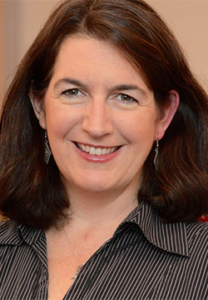
Dr. Andrea Broaddus is a transportation policy expert focused on managing the demand for travel through behavioral incentives and land use practices. She has published articles on road pricing and transit-oriented development and has served as a lecturer at UC Berkeley and San Jose State since 2010. She currently works as a Research Scientist for Ford, in Palo Alto. Other private sector experience includes research on future mobility topics for Robert Bosch LLC and as a planning practitioner with Nelson/Nygaard Consulting Associates. Dr Broaddus has also worked in non-profit advocacy on local and state transportation policy in Madison, WI, and federal policy in Washington, DC. Her research on European transportation policy and practice led to year-long fellowships in Hamburg, Germany, and London, England. She holds a Bachelor of Science in Geology from the University of North Carolina at Chapel Hill, Masters of Public Policy / Urban Planning from the Harvard Kennedy School, and a PhD in Transportation Planning from UC Berkeley.
Stephen Parkes, Sheffield Hallam University, UK

Steve Parkes is a mixed-methods researcher based within the Sustainable Futures Cluster in the Centre for Regional Economic and Social Research. His area of expertise is transport but he has also been involved in projects across energy, just transitions, and inclusive growth. His current areas of work encompass the following: active travel; high consumers of energy and transport; autonomous vehicles. Since 2019 he has been a co-editor of the People, Place and Policy journal. Prior to CRESR, Steve worked as a Research Fellow in the School of Geography at the University of Nottingham working within a Leverhulme Trust funded interdisciplinary project on urban sustainability. His PhD (University of Leeds, 2011-2015) focused on the impact of disruptive events on individual travel behaviour, adopting a case-study of the London 2012 Olympic Games.
Marc Schlossberg, University of Oregan, USA
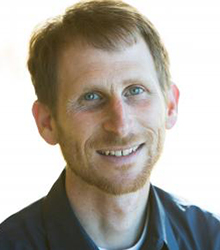
Marc Schlossberg is a professor of city & regional planning and co-director of the Sustainable Cities Initiative (SCI) at the University of Oregon. He works on the interconnected and interdisciplinary issues around sustainable cities, with particular focus on active transportation, urban design, public health, participatory mapping, and social change. Schlossberg’s applied research focuses on redesignining cities so that more people can walk and bike more of the time. This work has ranged from bottom-up, participatory GIS planning to more standard analysis of urban form and transportation. He was a Distinguished Fulbright Scholar to the United Kingdom in 2009-10, and a Senior Fulbright Scholar in Israel in 2015-16. He is a member of the NITC executive committee and is the faculty advisor for LiveMove, the University of Oregon’s transportation and livability student group.
Chair: Sally Hardy, Regional Studies Association, UK
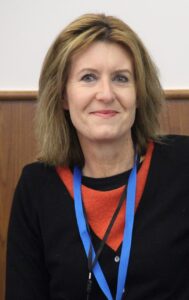
Sally Hardy began her career at the Economic and Social Research Council where she worked as a Scientific Officer in the Industry and Employment Committee dispensing funding to UK based social science academics. Sally moved to the Regional Studies Association where she has been CEO for just over 30 years. She has developed the organisation from a small, UK focused organisation into a global Association with an international footprint. Sally has become an advocate on publishing issues for the learned society sector speaking regularly at national conferences and events. She has advocated on different aspects of Open Access – for journals as well as for monographs and also around copy right reform and educational exceptions. She speaks on publishing practice and particularly on how to grow impact from publishing activity and on issues of learned society strategy.
Climate change has given new urgency to a challenge that urban planning has faced for decades: how to implement transit-connected communities. In this webinar, we explore how emissions can be reduced by increasing densities and diversifying uses around rapid transit stations. The webinar discusses three metropolitan regions and how the planning law uniquely positions the regional planning agency to facilitate integrated land use and transit decision-making. Join us for this webinar to hear about the role of regional planning in facilitating transit-connected communities.
Speakers:
Deborah Heinen, Hamburg Metropolitan Region, Germany
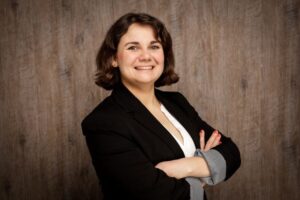
Dr. Deborah Heinen is a regional planner with the Hamburg metropolitan region (Germany). Driven by her passion for cities, her PhD research focused on climate governance and urban planning. Learning from planners in the three regions of Seattle, Vancouver and Stuttgart about plan implementation, climate governance and growth management has been a rewarding experience that she is excited to share in her book “Climate Governance and Urban Planning”. Deborah received her PhD from HafenCity University Hamburg in urban and regional planning. Her expertise includes climate governance, growth management, shrinking cities, and spatial planning.
Jörg Knieling, HafenCity University, Germany
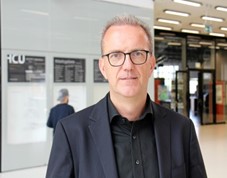
Jörg Knieling is Professor and Head of the Institute of Urban Planning and Regional Development at HafenCity University Hamburg (HCU). His academic background is in urban, regional and environmental planning, and in political sciences and sociology. He holds a Ph.D. from the University of Hanover. His research team includes about fifteen young and senior researchers from different disciplinary backgrounds.
Joerg is member of the German Academy for Territorial Development (ARL), Co-Head of the Advisory Board on Territorial Development of the respective German Federal Ministry, and Deputy of the Scientific Advisory Board on Climate Change of the City of Hamburg. He was ‘Directeur d’Etudes Associé’ of the Institute of Advanced Studies (IEA) in Paris and Visiting Professor at Politecnico di Milano.
Joerg’s main research fields are visions and strategies of sustainable urban and regional development, climate change and territorial innovation (e.g. circular city), and related aspects of (transition) governance.
Roger Kiel, York University, Canada

Roger Keil is Professor in the Faculty of Environmental and Urban Change, York University. He researches global suburbanization, urban political ecology, cities and infectious disease, infrastructure, and regional governance. Among his publications are Suburban Planet (Polity, 2018) and After Suburbia (UTP, ed. with Fulong Wu, 2022) as well as Pandemic Urbanism (Polity, 2023) and Turning Up the Heat: Urban political ecology for a climate emergency (MUP, ed. with Kaika, Mandler and Tzaninis, 2023).
Chair: Joan Fitgerald, Northeastern University, USA
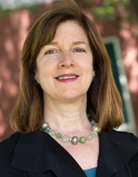
Prof. Fitzgerald’s latest book is Greenovation: Urban Leadership on Climate Change (Oxford Univ. Press, 2020), which examines leading practices in North America and Europe. Her article, Cities on the Frontlines, appeared in a special issue of the American Prospect on the Green New Deal in December 2019. She published this op-ed as a leading expert to the C-40 Cities Global Mayors COVID-19 Recovery Task Force.
This webinar will discuss the papers from the recently published book Questioning Planetary Illiberal Geographies: Territory, Space and Power, the chapters in this book were originally published as a special issue of Territory, Politics, Governance.
This book engages with current debates on ‘planetary urbanization’ and the nature of urban political theory but notably considers the implications of illiberalism on space, territory, and power. Such a focus is timely, as illiberalism (across various settings and terrains) is producing, and embedded in, increasingly complex, hybrid, multi-scalar, non-linear, and globally networked flows.
Through ordinary explorations drawn from diverse empirical case studies (China, the United States, India, South Korea, and Singapore) and via mixed methodologies, the chapters in this volume seek to advance theory that moves beyond assumptions and certainties of what illiberalism is, how and where it operates, what it looks like, and how it is experienced and embodied in different contexts, offline and online. Chapters critically reflect upon themes like authoritarianism and the spatialization of illiberal power, from the grassroots up to national governments, and stress the need to move beyond normative understandings and portrayals of these terms and concepts. Presciently, this volume looks back on recent history, pre-dating the Covid-19 pandemic and some of the shocking political transformations now underway: as such, the chapters offer a valuable lens to critically consider issues like public health policies, surveillance and policing, borders and bordering, and activism and resistance.
This book was published in the RSA Regions and Cities Book Series, click here to receive 20% discount when buying the book. RSA members are entitled to a 30% discount on all Routledge books. To order, email Annie Hearfield (annie.hearfield@tandf.co.uk), or phone on +44 (0) 7909 011 011 and declare your RSA membership.
Speakers:
Jason Luger, Northumbria University, UK
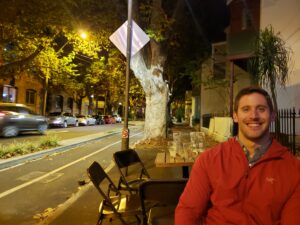
Jason Luger is Assistant Professor of Human Geography at Northumbria University, Newcastle upon Tyne, UK. His research focuses on the production, experience and contestation of urban space, especially the relationship between urban space and illiberalism. Jason’s research draws from comparative urbanism ethnography, and theories from across urban, political, social, and cultural geographies.
Ashima Sood, Anant National University, India
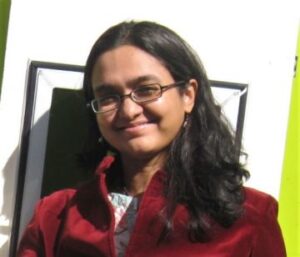
Currently Associate Professor at Anant National University, Ashima Sood studies urban policy and governance in the Indian context. Sood’s research lies at the intersection of institutional economics and urban and development studies. It combines qualitative and quantitative methodologies to examine privatized forms of urban governance and informal public spaces in India. Sood’s research has received recognition, fellowships and grants from international and national funders such as the Azim Premji University Foundation, the Indian Institute of Advanced Study, Shimla, the Centre de Science Humaines and the India Foundation for the Arts, among others. Her work has been published in scholarly outlets such as Urban Studies, Cities, Territory, Politics and Governance, alongside many others. She studied at the Delhi School of Economics, the University of California-Davis and Cornell University and was Urban Studies Foundation International Fellow at the Oxford Department of International Development over April-July 2022. She is also Co-Director of the Centre for Urbanism and Cultural Economics at Anant National University. She is the Winter Term 2023 Visiting Professor at the Carleton University Institute of Political Economy.
Loraine Kennedy, CNRS, France

Loraine Kennedy is a CNRS Research Director and member of the Center for South Asian Studies (CEIAS) in Paris at the École des Hautes Études en Sciences Sociales (EHESS). Her most recent publications include a co-edited volume, India’s Greenfield Urban Future. The Politics of Land, Planning and Infrastructure (Orient Blackswan, 2023) and a co-edited special issue “Engaging the Urban from the Periphery”, SAMAJ South Asia Multidisciplinary Academic Journal (2021). She serves as a trustee of the Glasgow-based Urban Studies Foundation.
Sam Tynen, George Washington University, USA

Sam Tynen holds a PhD in Human Geography from University of Colorado Boulder. He lived in China for a total of five years from 2009-2017. His research focuses on state-building, nationalism, and ethnic conflict in Asia. His publications have appeared in Political Geography, Geopolitics, and Geographical Review, among others. His forthcoming book with IB Tauris is titled Fear, Hope and Survival in Xinjiang: Uyghur Life in China’s Military Police State. Learn more at samtynen.com.
Janika Kuge, University of Freiburg, Germany
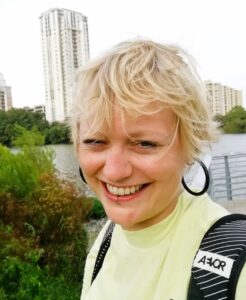
Janika Kuge is research and teaching assistant in political and economic geographies at University of Freiburg, Germany since 2016. Her PhD follows the conflicts around Sanctuary policy in the US from a relational state theory approach. She is interested in questions of political legal geographies at the nexus with state theory and migration.
Kristin Sziarto, University of Wisconsin-Milwaukee, USA
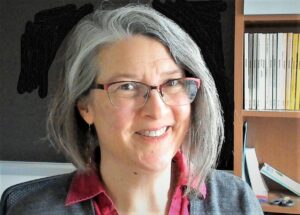
Kristin Sziarto is a feminist political geographer who studies social movements in relation to spaces of the city, belonging and identity, and the state and nationalism. In addition to her work with So Hung Lim on Korean politics, she has written on the politics of infant mortality reduction programs, religion-labor organizing, and on teaching and learning at the university level.
Chair: Zack Taylor, University of Western Ontario, Canada

Zack Taylor is Associate Professor of Political Science at the University of Western Ontario in London, Canada, where his research explores political and electoral geography and the multi-level governance of cities. His book Shaping the Metropolis: Institutions and Urbanization in the United States and Canada was published by McGill-Queen’s University press in 2019.
This webinar will explore important research questions about the role and position of small and medium-sized towns.
In many countries across the world, small and medium-sized towns (SMSTs) play an important role in the urban system. Yet, they are often overlooked and undervalued when compared to large cities. In recent years, however, scholarly attention towards SMSTs has increased, and this work has led to a myriad of findings that encourage us to rethink some consolidated concepts and theories about urban development. In this webinar we focus in particular on a relational perspective of small and medium-sized towns, and we want to clarify that we need to go beyond population sized when studying smaller urban places.
This session will begin with a short presentation of the newly published book “A Research Agenda for Small and Medium-Sized Towns” with which we will outline the key challenges of current research on the topic. We then will move on to two to three input presentations by chapter authors of the book. We close the session with a final discussion that is also open to questions from the audience.
Speakers:
Heike Mayer, University of Bern, Switzerland
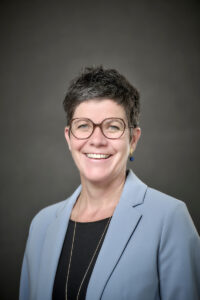
Heike Mayer is professor of economic geography at the University of Bern in Switzerland. Her research is in local and regional economic development with a focus on dynamics of innovation and entrepreneurship, place making and sustainability. Heike started her academic career in the United States, where she completed a Ph.D. in Urban Studies (Portland State University) and held a tenured professorship at Virginia Tech University. She is author of the book Entrepreneurship and Innovation in Second Tier Regions (Edward Elgar, Cheltenham), co-author of Small Town Sustainability (Birkhäuser Press, Basel), and co-author of The Political Economy of Capital Cities (Routledge, London).
Evert Meijers, Utrecht University, The Netherlands

Evert is Associate Professor at the Department of Human Geography and Spatial Planning, Utrecht University. He has a passion and reputation for innovative research and teaching in Urban and Regional Studies. In his research, he creatively combines insights from economic and urban geography, spatial planning, environmental studies, regional science, urban economics, cultural geography, media studies, regional studies and policy sciences in order to develop empirically underpinned territorial strategies that make cities and regions better able to satisfy human and societal needs. He is committed to knowledge dissemination through actively seeking co-operation with communities, governments, industry and other scholars. His work has appeared in many different journals and books, and has attracted attention in academia and policy practice. He recently received several best paper awards and acquired many larger and smaller research grants, including highly-competed for personal grants, and has a track record in leading research teams. Before moving to Utrecht University, he was Research Director of the Urbanism Department at Delft University of Technology and associated with the Amsterdam Institute for Advanced Metropolitan Solutions.
Annett Steinführer, Thünen Institute, Germany

Annett Steinführer is a senior researcher at the Johann Heinrich von Thünen Institute in Braunschweig which is the German Federal Research Institute for Rural Areas, Forestry and Fisheries. She is a rural scholar with a background in urban sociology and geography. Her current research projects focus on the role of migration and staying in rural housing biographies, on everyday lives in peripheralized regions, on rural public services as well as on social and demographic changes in small towns. She is one of the co-founders of the German Informal Network of Small-Town Research and was co-editor of the Kompendium Kleinstadtforschung (2021, in German).
Koen Salemink, University of Groningen, The Netherlands
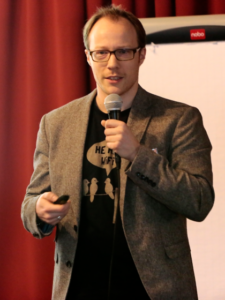
Koen Salemink is Assistant Professor in Cultural Geography at the Faculty of Spatial Sciences, University of Groningen, the Netherlands. Originally he was trained as a human geographer and planner and a cultural geographer. Koen’s objective has been to combine insights from economic, social and cul- tural geographies to better understand how communities deal with social and digital exclusion. In his research he focuses on rural areas and non-metropolitan regions. Koen has been part of several European research projects (e.g. INTERREG 4B and 5B, Horizon 2020), enabling him to acquire insights into how digital rural development works in different countries. His work has appeared in the Journal of Rural Studies, Sociologia Ruralis, Environment and Planning A and Local Economy. He is also European Editor for Local Economy.
Chair: Michela Lazzeroni, University of Pisa, Italy

Michela Lazzeroni is associate professor in Economic and Political Geography in the Department of Civilizations and Forms of Knowledge at the Univetsity of Pisa (Italy) where she completed a PhD in Urban and Regional Studies. Her main research interests concern the geography of knowledge and innovation, the impact of the fourth industrial revolution between opportunities and inequalities, the relation between university and territorial development, urban resilience and local strategies based on cultural heritage and food, smart urbanism and AI city. About small and medium-sized towns, she has published “Industrial decline and resilience in small towns: Evidence from three European case studies,” Tijdschrift voor Economische en Sociale Geografie (111(2), 2020), “Beyond ‘town and gown’: The role of the university in small and medium-sized cities,” Industry and Higher Education (29(1), 2015) as co-author, and “The territorial approach to cultural economy: New opportunities for the development of small towns,” European Planning Studies (21(4), 2013) as co-author. She is member of the board of the Society of Geographic Studies (Italy).
In this webinar we explore the making, unmaking and remaking of social infrastructure (SI) in ‘left behind places’ (LBPs) through a case study a former mining village in northern England. We address the understudied affective dimensions of ‘left-behindness’. Seeking to move beyond a narrowly economistic of reading LBPs, our framework emphasises the importance of place attachments and the consequences of their disruption; considers LBPs as ‘moral communities’, seeing the making of SI as an expression of this, views the unmaking of SI through the lens of ‘root shock’ and explains efforts at remaking SI in terms of the articulation of ‘radical hope’.
Click here to find out more about the Policy Expo.
Click here to find out more about the Policy Expo Grant Scheme.
Speaker: John Tomaney, Bartlett School of Planning, UCL, UK
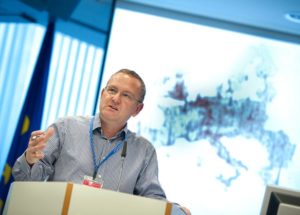
John Tomaney is Professor of Urban and Regional Planning in the Bartlett School of Planning, University College London. He is a Fellow of the Academy of Social Science. John’s work has been funded by research councils and foundations, international organisations, national, regional and local governments and non-governmental organisations in the UK and elsewhere. He is co-investigator on the project The ‘Beyond ‘Left Behind’ Places: Understanding Demographic and Socio-economic Change in Peripheral Regions in France, Germany and the UK’ project is funded by the Economic & Social Research Council, L’Agence nationale de la recherche and Deutsche Forschungsgemeinschaft. He contributes regularly to the broadcast and print media. He was a member of the UK2070 Commission on regional inequalities, chaired by Lord Kerslake, and is Trustee of Redhills: the Durham Miners’ Hall. He tweets at: @johntomaney.
Chair: Natasha Vall, Teesside University, UK
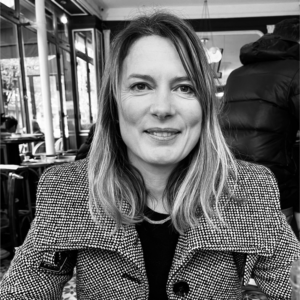
Natasha Vall is Professor of Urban and Cultural History and the Dean of the School of Social Sciences, Humanities and Law at Teesside University. She specialises in urban renewal in industrial and postindustrial cities. Her current work is focussed on the development of an innovative and sustainable infrastructure that brings together community members, policymakers, researchers, and businesses to develop a research agenda that will effect real change in the Tees Valley region. Her projects aligned to this work have been funded by UKRI, the Arts and Humanities Research Council and the Heritage Lottery Fund.
This webinar presents research funded by the RSA FeRSA Grant.
Energy and low carbon transitions are impacting processes of economic restructuring, in turn producing new economic geographies. In this webinar we focus on places that have experienced waves of economic restructuring for the last 50 years as heavy industry has transformed, often leaving old industrial places with challenging legacies of unemployment, disinvestment and disenchantment. New energy economies layer onto these challenges, producing potential for economic change, development, growth or further loss. In these talks we will outline research on different industrial towns across Europe that have for different reasons found themselves at the frontier of new energy economies: we examine how these changes are unfolding, and what they mean for future economic geographies.
Speaker: Will Eadson, Sheffield Hallam University, UK

Will Eadson is Professor of Urban and Regional Studies at Sheffield Hallam University, where he leads a programme of research on zero carbon economy and enterprise. His research focuses on the economic and political geographies of zero carbon transitions, with particular focus on place-based implications set within examination of broader economic and social inequalities.
Lidia Greco, University of Bari, Italy

Lidia Greco is full professor of economic and labour sociology at the University of Bari. Her main fields of research are industrial and regional development, global value chains, labour market and policies.
She has been involved in a series of European funded projects and more recently in the EU Just Transition Platform as member of the steel group. For the University of Bari she is in charge of following the process of the just transition in the Taranto area. She is author of many articles and books published in international peer-reviewed journals.
Chair: Richard Crisp, Sheffield Hallam University, UK

Richard Crisp is a researcher at the Centre for Regional Economic and Social Research (CRESR) at Sheffield Hallam University. He specialises in research on inclusive and sustainable economies, ‘alternative’ approaches to economic development, poverty, worklessness, and social and spatial inequalities.
This webinar presents research funded by the RSA MeRSA Grant.
While the concept of adaptive reuse is widely prescribed in the existing literature as a panacea for revitalising derelict buildings, there seems to be a knowledge gap on how it could be useful in Ghana’s coastal cities. These cities are characterised by many old and historic buildings constructed during Ghana’s colonial era that are decaying due to continuous neglect. Cities’ transformation through regeneration and adaptive reuse of derelict buildings is yet to become a policy priority in Ghana. The increasing demand for buildings for different uses in Ghana’s twin city, Sekondi-Takoradi makes this research important and timely.
This research aims to explore the drivers of derelict old and historic buildings in Sekondi, the older part of the Sekondi-Takoradi metropolis and to propose a strategy for utilising those buildings. This is deemed necessary for a city which is striving to ensure that its infrastructure, including buildings, keeps pace with the increasing population, a phenomenon largely induced by the in-migration of people in search of oil-related opportunities. The study is grounded in action research design and will rely on a qualitative approach for empirical analysis. I will use interviews, oral histories, building tours and archival materials to construct histories of the case study vicinities in Sekondi and to understand why buildings are being neglected. Additional interviews with owners/families, planners, city authorities, architects and other relevant stakeholders will be used to determine how neglected buildings could be revitalised and given new functional uses.
The research is expected to inform local policy on integrating the regeneration of old and historic derelict buildings in the planning schemes of Sekondi-Takoradi as well as provide data on the attributes and history of buildings since such information is rarely documented. Promoting adaptive reuse of historic buildings will create a myriad of economic opportunities for people, contribute to heritage conservation, inspire a sense of community and a basis for the city to reinvent itself.
Speaker: Isaac Kwamena Arthur, University of Ghana, Ghana

Isaac K. Arthur currently works at the Department of Geography and Resource Development , University of Ghana. Isaac is a multidisciplinary researcher and is interested in urban planning and development, qualitative social research, the experience economy, innovations and entrepreneurship in rural food-related enterprises; migration in conflict zones, informal settlements, effects of urban heat islands on urban agriculture and urban governance studies.
Chair: Theo Mugiraneza, Cadasta Foundation, Sweden
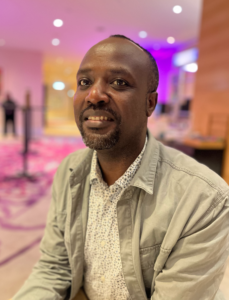
Theodomir Mugiraneza, who joined Cadasta in September 2023 as a GIS Specialist. In his role, he develops and implements spatial databases and GIS software solutions. Theodomir is a passionate GIS and remote sensing scientist with over 16 years of experience. Before joining Cadasta, he served as a researcher and university lecturer. Theodomir holds a Ph.D. in Geoinformatics from KTH, Royal Institute of Technology, Sweden, a Master of Science in Geoinformation Science and Earth Observation, and a Bachelor of Science in Physical and Human Geography. He will provide invaluable Indigenous and local community mapping support to the Tenure Facility in Stockholm, Sweden.
The issue of ‘left-behind places’ has emerged as a topic of great interest to researchers and policy-makers in recent years, focusing on economically declining and lagging areas beyond the major city-regions. While different terms are used in different countries, there is a shared concern with the fate of such lagging areas. This concern has been heightened by the growth of a ‘geography of discontent’, with ‘left behind’ areas often identified as hotbeds of dissatisfaction and populist support.
This online seminar is based on a cross-national research project that has sought to get beyond the overarching’ label of ‘left behind places’ to investigate actual processes of changes in these areas through in-depth research in France, Germany and the United Kingdom (UK). In the first part of the seminar, the research team will present key emerging findings from this cross-national project, based upon three main themes: residential mobility and immobility; the changing role of place; and, governance and policy. In the second part of the seminar, leading researchers and policy-makers will offer reflections on, and suggestions for, new policy approaches to address the ‘left behind’ condition.



Session 1 – Key Findings
Chair: Danny MacKinnon, CURDS, Newcastle University, UK
Speakers:
Mobility and Immobility: Sanne Velthuis, CURDS, Newcastle University, UK
Changing Perception of Place: Tim Leibert, Leibniz Institute of Regional Geography, Germany
Governance and Politics: Vincent Béal, University of Jean Monnet St Etienne, France& Max Rousseau Centre for International Cooperation in Agronomic Research for Development (CIRAD), France
Session 2 – Panel Discussion – Policies for ‘Left Behind Places’
Panellists
John Tomaney, University College London, UK
Marc Doussard, University of Illinois Urban-Champaign, USA
Jennifer McGarrigle, University of Lisbon, Portugal
Lavea Brachman, Brookings Metro, USA
This online seminar is based on a cross-national research project that has sought to get beyond the overarching’ label of ‘left behind places’ to investigate actual processes of changes in these areas through in-depth research in France, Germany and the United Kingdom (UK). In the first part of the seminar, the research team will present key emerging findings from this cross-national project, based upon three main themes: residential mobility and immobility; the changing role of place; and, governance and policy. In the second part of the seminar, leading researchers and policy-makers will offer reflections on, and suggestions for, new policy approaches to address the ‘left behind’ condition.



Chair: Danny MacKinnon, CURDS, Newcastle University, UK
Session 2 – Panel Discussion – Policies for ‘Left Behind Places’
Panellists
John Tomaney, University College London, UK
Marc Doussard, University of Illinois Urban-Champaign, USA
Jennifer McGarrigle, University of Lisbon, Portugal
Lavea Brachman, Brookings Metro, USA
Finance is a necessary resource for the development of regions, cities, and industries, but also represents a system of human-environment relationships central to their evolution. To explain and illustrate this argument, I will talk about regions, cities, and industries across times and places from a financial geography perspective. Illustrations will come from Atlas of Finance: Mapping the Global Story of Money – the first ever book-size collection of maps and visuals dedicated to the topic of finance and a unique exploration of the development of finance that combines data from every part of the world and covers five thousand years of history. With word and image, the atlas aims at changing the way people view both their money and their world. Whether we focus on financial centre development, financial innovation, financial instability or other topics, we cannot understand regions, cities, and industries without understanding finance.
Speaker: Dariusz Wójcik, National University of Singapore

Dariusz Wójcik is a Professor of Financial Geography at National University of Singapore and an Honorary Research Associate at Oxford University. While specializing in financial geography, he has published widely in human geography and urban studies, finance and economics, and political economy. His recent books include The New Oxford Handbook of Economic Geography (OUP), International Financial Centres After the Global Financial Crisis and Brexit (OUP), Sticky Power: Global Financial Networks in the World Economy (OUP), and The Atlas of Finance: Mapping the Global Story of Money (Yale UP). He is the Chair the Global Network on Financial Geography, Editor-in-Chief of Finance & Space journal, a Fellow of the Academy of Social Sciences and a Fellow of the Regional Studies Association.
Chair: Franziska Sohns, Anglia Ruskin University

Franziska Sohns currently works as an Associate Professor in Economic Geography at Anglia Ruskin University, where she acts as the co-founder of the Behavioural Insights Lab (BIL) and as the Innovation and Knowledge Exchange Lead of the School of Economics, Finance, and Law. Franziska’s research interests focus on Entrepreneurial Economics, Evolutionary Economic Geography, Political and Institutional Change, and Quantitative Methods. Franziska is also an elected member of the FinGeo committee.
In this webinar, Legal Geography for Regions and Cities: A Place-first Approach, we will explore how law shapes and is shaped by the spaces we inhabit. We will discuss the everyday presence of law on the ground, with particular attention to its impact at the urban level. By adopting a place-first approach, we will examine how legal frameworks intersect with geography to influence communities, infrastructure, and local decision-making.
Speakers:
Dr Luke Bennett, Sheffield Hallam University, UK
Dr Athena Michalakea, Athens Bar, Greece and Birkbeck, University of London, UK
Pr Phil Hubbard, King’s College London, UK
Chair:
Dr Jenny Kanellopoulou: Manchester Law School, Manchester Metropolitan University
Book Launch: Contemporary South Africa and the Political Economy of Regional Development
South Africa’s struggle in balancing its domestic needs while playing a dynamic developmental role in the African region and global context exposes a complex web of relations shaped by its geostrategic location on the continent and the world, and the staggering legacies of colonialism and apartheid. As such, understanding the complexities of the global economy and of South Africa’s place in it, is of great importance. This book builds upon an existing body of literature which has demonstrated that while the post-apartheid South African state has recast its nation building goals – with advances having been made notably in the area of a stellar post-apartheid constitution, policy directives, and democratic political integration – economic integration and policy implementation presents a projection of captured interests, where big business concerns are entrenched in the post-apartheid state’s apparent neo-liberal turn. The main focus of the book is to contextualise issues relating to three main trends in global discourses on development, which are significant for South Africa, and indeed, for the study of the political economy of regional development in the country from the prism of South Africa as a global capitalist state. These trends include the impact of globalisation, regionalisation, and the marginalisation of South Africa and indeed the African continent in the global economy, thus unpacking the possible role that South Africa might play in regional development.
Speakers: Ernst Drewes, North-West University, South Africa
Eric Makoni, University of Johannesburg, South Africa
Patrick Bond, University of Johannesburg, South Africa
Discussant: Isaac Khambule, University of Johannesburg, South Africa
Moderator: Methembe Mdlalose, University of KwaZulu-Natal, South Africa
Development has consistently been a critical issue across academic and policy domains. Currently, it is gaining further attention on the discussions about sustainable transformations, just transitions, and regional green growth. However, development promises are often yet to be fully realised, partly due to a persistent emphasis on economic growth as unique pathway to modernisation. In this webinar we will discuss territorial development through the lenses of Latin American scholarship and case studies, as contained in the recently launched book titled ‘Territorial Development in Latin America: Cultural, Economic and Environmental Dimensions’. Our aim is to bring a different way of understanding territory and addressing development, attending to the multiple dimensions that construct space (social, cultural, environmental, economic) and the power dynamics at play. We argue that this can enrich dominant theories and interventions, as it invites to consider how different worldviews and interpretations of the territory and economies can shape the wellbeing of people and the environment.
Chairs:
- Laura Sariego-Kluge, Universidad de Costa Rica, Costa Rica
- Diana Morales, University of Oslo, Norway
- Tiago Teixeira, Northumbria University, UK
Speakers:
- Ana Julia Cabrera, University of Edinburgh, UK
- Malena Castilla, National University of La Matanza and at the National Council of Scientific and Technical Research, Argentina
- Maclovia Corrêa da Silva and Ricardo Gomes Luiz, Federal University of Technology, Brazil
- Mariano Féliz and Martin Nicolas Sotiru, Centre for Geographic Research of the Institute for Research in Humanities and Social Sciences, Argentina
- Sebastián Saborío, Universidad de Costa Rica, Costa Rica